
Australia Recommends 2024

Come and Say G'day

G'day, the short film

Discover your Australia

Travel videos

Deals and offers

Australian Capital Territory

New South Wales

Northern Territory

South Australia

Western Australia

External Territories

The Whitsundays

Mornington Peninsula

Port Douglas

Ningaloo Reef

Airlie Beach

Kangaroo Island

Rottnest Island

Hamilton Island

Lord Howe Island

Tiwi Islands

Phillip Island

Bruny Island

Margaret River

Barossa Valley

The Grampians

Hunter Valley

McLaren Vale

Glass House Mountains

Alice Springs

Uluru and Kata Tjuta

The Kimberley

Flinders Ranges

Kakadu National Park

Eyre Peninsula

Karijini National Park

Great Barrier Reef

Blue Mountains

Daintree Rainforest

Great Ocean Road

Purnululu National Park

Cradle Mountain-Lake St Clair National Park

Litchfield National Park

Aboriginal experiences

Arts and culture

Festivals and events

Food and drink

Adventure and sports

Walks and hikes

Road trips and drives

Beaches and islands

Nature and national parks

Eco-friendly travel

Health and wellness

Family travel

Family destinations

Family road trips

Backpacking

Work and holiday

Beginner's guide

Accessible travel

Planning tips

Trip planner

Australian budget guide

Itinerary planner

Find a travel agent

Find accommodation

Find transport

Visitor information centres
Deals and travel packages

Visa and entry requirements FAQ

Customs and biosecurity

Working Holiday Maker visas

Facts about Australia

Experiences that will make you feel like an Aussie

People and culture

Health and safety FAQ

Cities, states & territories

Iconic places and attractions

When is the best time to visit Australia?

Seasonal travel

Events and festivals

School holidays

Public holidays
How to get to Australia's most iconic cities

How long do I need for my trip to Australia?

How to travel around Australia

Guide to driving in Australia

How to hire a car or campervan

How to plan a family road trip

How to plan an outback road trip

- Australian visa information
- Working holiday visas

Sydney Airport, New South Wales © Sydney Airport

Australian Visa and Entry Requirements FAQs
Learn about visa requirements for entry to Australia for tourism purposes with this list of frequently asked questions.
Please note this page is intended to provide general information only and does not constitute legal advice. Tourism Australia is not the Australian government visa granting authority. For information on visas to enter Australia, visitors should seek the most up-to-date information from Australian Government Department of Home Affairs .*
Ready to plan your trip? We're ready to welcome you! Here are some helpful tips for getting your visa sorted:
- Be sure to secure the appropriate visa before travelling to Australia. Use the Visa Finder to explore your options.
- Ensure all details are correct and provide all required documents when you apply. An incomplete or incorrect application can delay your visa.
- Submitting multiple applications at the same time can slow the process. For visitor visas, submit one application per person, including children.
- Questions? The Australian Government's Global Service Centre can help.
Australian Visa Information
Unless you are an Australian citizen, you will need a valid Australian visa to enter the country. New Zealand passport holders can apply for a visa upon arrival in the country. All other passport holders, regardless of age, must apply for a visa before leaving home. You can apply for a range of Australian visa types, including tourist visas and working holiday visas, via the ETA app or on the Department of Home Affairs website.
There are different Australian visa types available for travellers to Australia. Knowing which Australian visa to apply for depends on the length of your stay, your passport and the purpose of your visit. You’ll also need to meet certain financial and medical requirements, be outside of Australia when applying and maintain health insurance for the duration of your stay.
Electronic Travel Authority visa (subclass 601) This visa allows you to visit Australia as many times as you want, for up to a year, and stay for three months each visit. This visa is available to passport holders from a number of countries and regions, who live outside Australia. A step-by-step guide on how to apply is here .
All ETA-eligible passport holders must apply for an ETA using the Australian ETA app. Agents can assist you in the application process, but you must be physically present as a live facial image is required.
eVisitor (subclass 651) This is a free visa for multiple visits to Australia for tourism or business purposes for up to three months at a time within a 12-month period. This visa is available to passport holders from a number of European countries and it cannot be extended.
Visitor visa (subclass 600) The Visitor visa allows you to visit Australia, either for tourism or business purposes. It is open to all nationalities. Generally, a period of stay of up to three months is granted, but up to 12 months may be granted in certain circumstances. Applicants will have to pay a fee to submit their application.
The application process may differ depending on which visa you need.
You can only apply for the Electronic Travel Authority visa (subclass 601) through the Australian ETA app. A step-by-step guide on how to apply is located here .
For other visas, you can apply online by creating an ImmiAccount and completing the application process. Be sure to submit your application well in advance of your travel date to allow enough time for processing. You may be asked to provide further supporting information. You will be notified in writing if your tourist visa is approved and it will be digitally linked to your passport. For more information on different visa types, and Australian visa requirements including how to apply for an Australian visa, visit the Department of Home Affairs website.
If you are already in Australia and hold a valid Electronic Travel Authority visa (subclass 601) you can extend your stay by applying for another visa, such as a Visitor visa (subclass 600). An eVisitor (subclass 651) cannot be extended.
See the Department of Home Affairs website for details.
Working Holiday Visas
Australia's Working Holiday Maker program allows visitors aged under 30 (or 35 in certain cases) who hold a passport from a participating country to travel and work in Australia. Working holiday visas are valid for one year, or up to three years if you meet certain conditions.
Find out more about working holiday visas here .
*Australian visa regulations (including visa application charges) change from time to time. The information provided here is valid at the time of publication, but visitors should check this information is still current by visiting the Australian Department of Home Affairs .
More articles like this

We use cookies on this site to enhance your user experience. Find out more . By clicking any link on this page you are giving your consent for us to set cookies.
Acknowledgement of Country

We acknowledge the Traditional Aboriginal and Torres Strait Islander Owners of the land, sea and waters of the Australian continent, and recognise their custodianship of culture and Country for over 60,000 years.
- New Zealand (English)
- United States (English)
- Canada (English)
- United Kingdom (English)
- India (English)
- Malaysia (English)
- Singapore (English)
- Indonesia (Bahasa Indonesia)
- Deutschland (Deutsch)
- France (Français)
- Italia (Italiano)
- 中国大陆 (简体中文)
*Product Disclaimer: Tourism Australia is not the owner, operator, advertiser or promoter of the listed products and services. Information on listed products and services, including Covid-safe accreditations, are provided by the third-party operator on their website or as published on Australian Tourism Data Warehouse where applicable. Rates are indicative based on the minimum and maximum available prices of products and services. Please visit the operator’s website for further information. All prices quoted are in Australian dollars (AUD). Tourism Australia makes no representations whatsoever about any other websites which you may access through its websites such as australia.com. Some websites which are linked to the Tourism Australia website are independent from Tourism Australia and are not under the control of Tourism Australia. Tourism Australia does not endorse or accept any responsibility for the use of websites which are owned or operated by third parties and makes no representation or warranty in relation to the standard, class or fitness for purpose of any services, nor does it endorse or in any respect warrant any products or services by virtue of any information, material or content linked from or to this site.
These are the new visa perks for Indonesians travelling to Australia
Indonesians will be able to access a frequent traveller visa under a new deal. here's what else is changing..
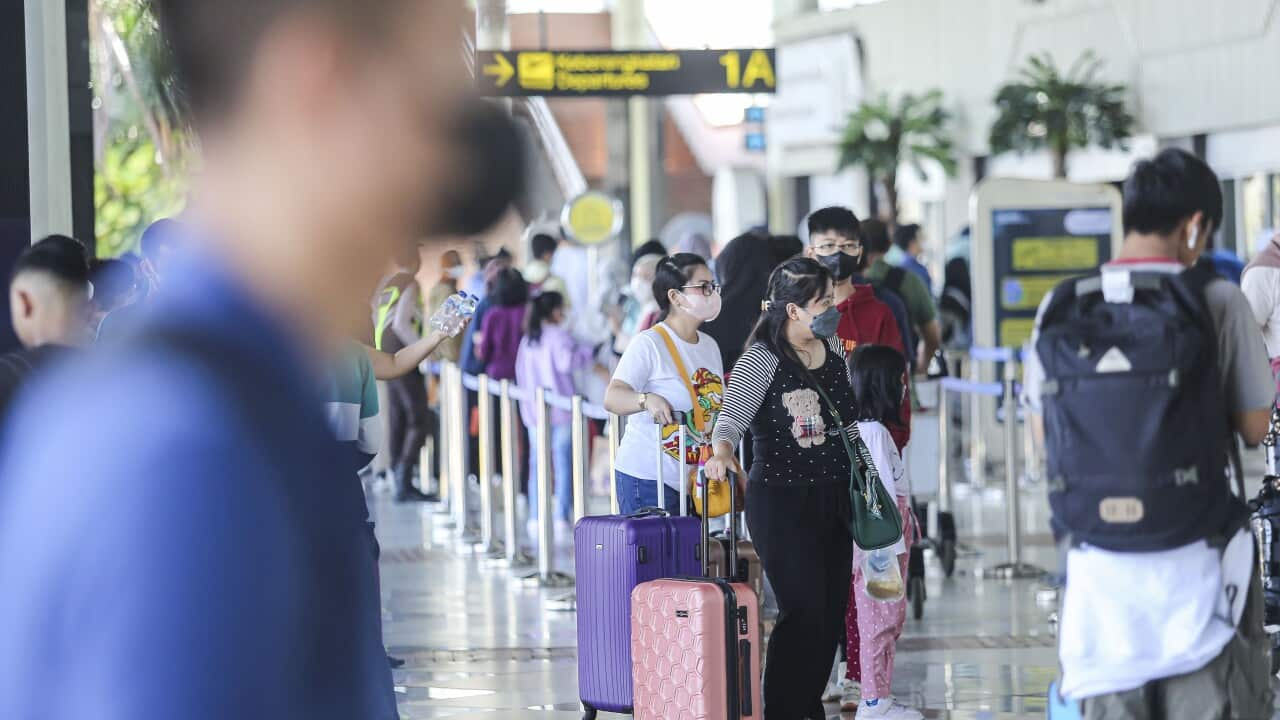
Travellers at Indonesia's Soekarno-Hatta International Airport. Indonesian ePassport holders will be prioritised by getting access smart gates at Australian airports. Source: Getty, Anadolu / Anadolu Agency/Anadolu Agency via Getty Images
- Prime Minister Anthony Albanese has met with Indonesia's president, making a series of announcements.
- Education, renewables and visa perks for Indonesians were among them.
- Indonesia also wants Australia's help on EV batteries and building its new capital city.
What new Australian visa changes are ahead for Indonesians?

Australia seeking to boost Indonesian language studies
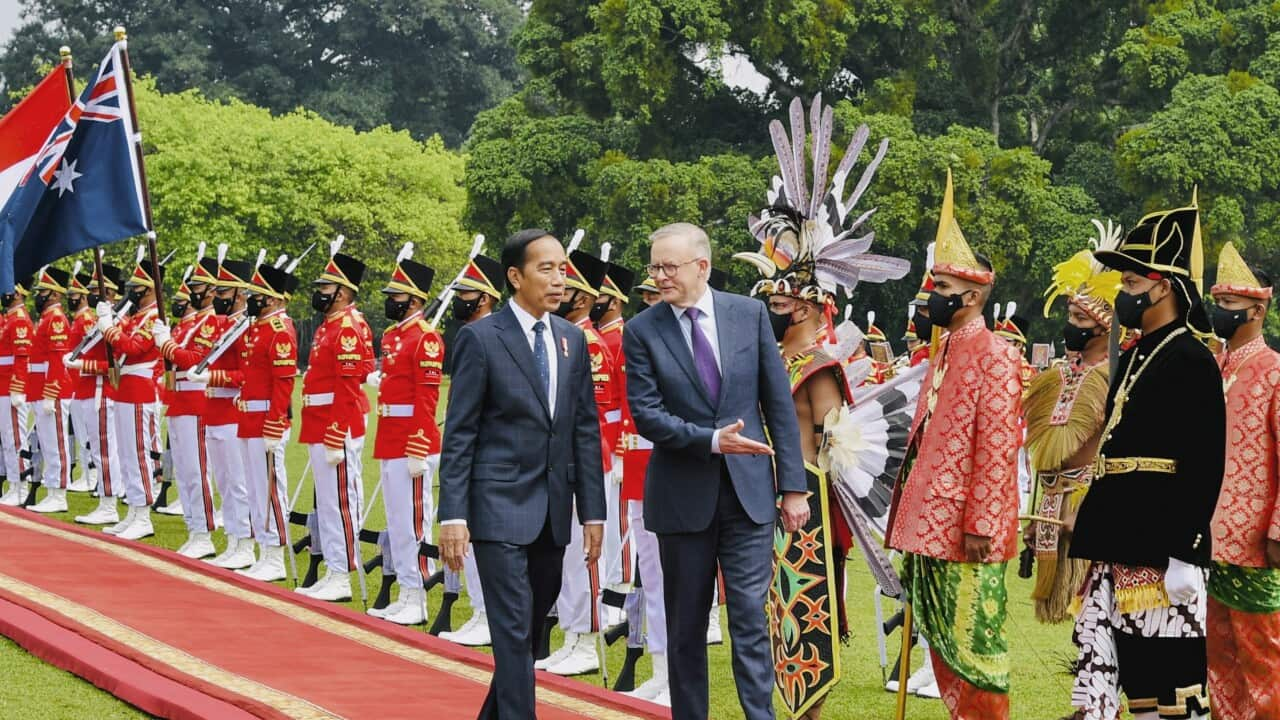
It's Australia's 'close friend' and a ‘future superpower’. Should more people learn its language?
Indonesia wants Australia to work on EV batteries

Want to do your job from paradise? These countries are offering 'digital nomad visas'
Indonesia invites Aussie companies to build capital city

Share this with family and friends

Recommended for you

Wages on the rise: How does your income compare to others?
Personal income

Points test system for skilled migrants set for overhaul

Almost a third of Aussies were born overseas. These are the countries they're coming from
Migrating to Australia

'Dream big': First astronaut to represent Australia hopes to inspire
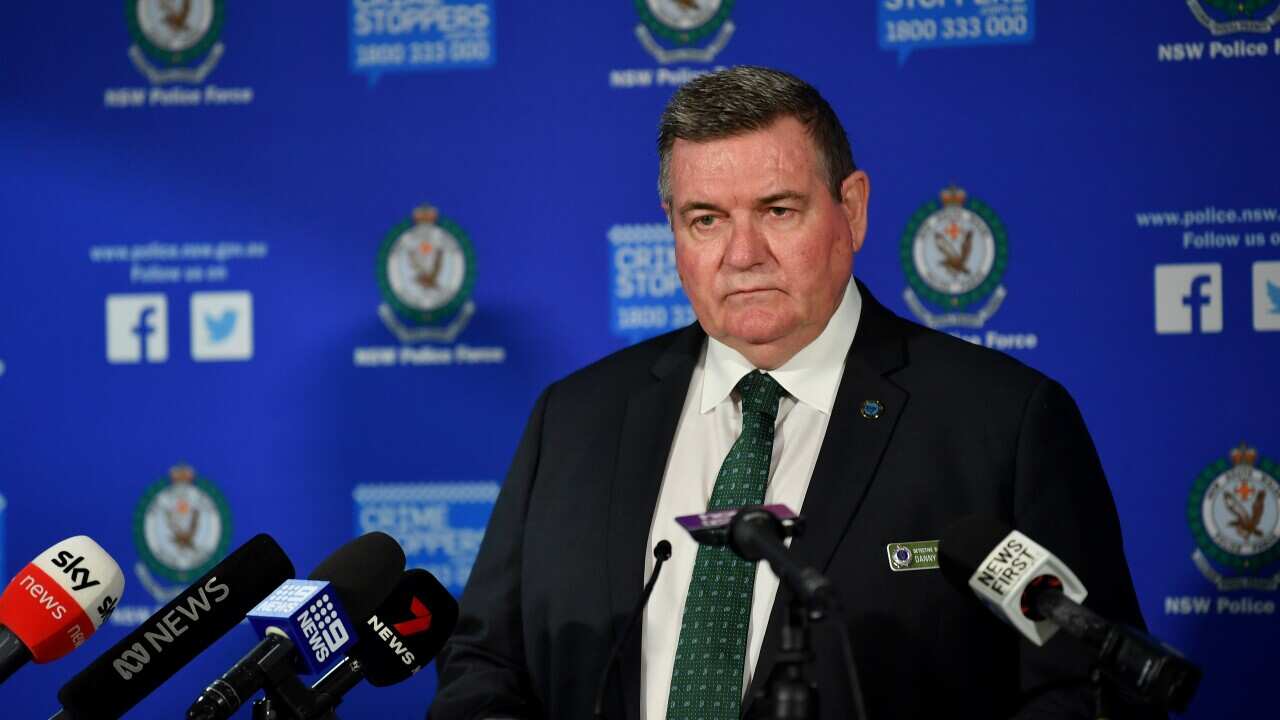
Teen stabbed 10-year-old sister 'completely out of the blue', police say

Anzac Day trading hours 2024: What's open and when

H5N1 bird flu has now spread to every continent except Australia. How can we prepare?
Community Health
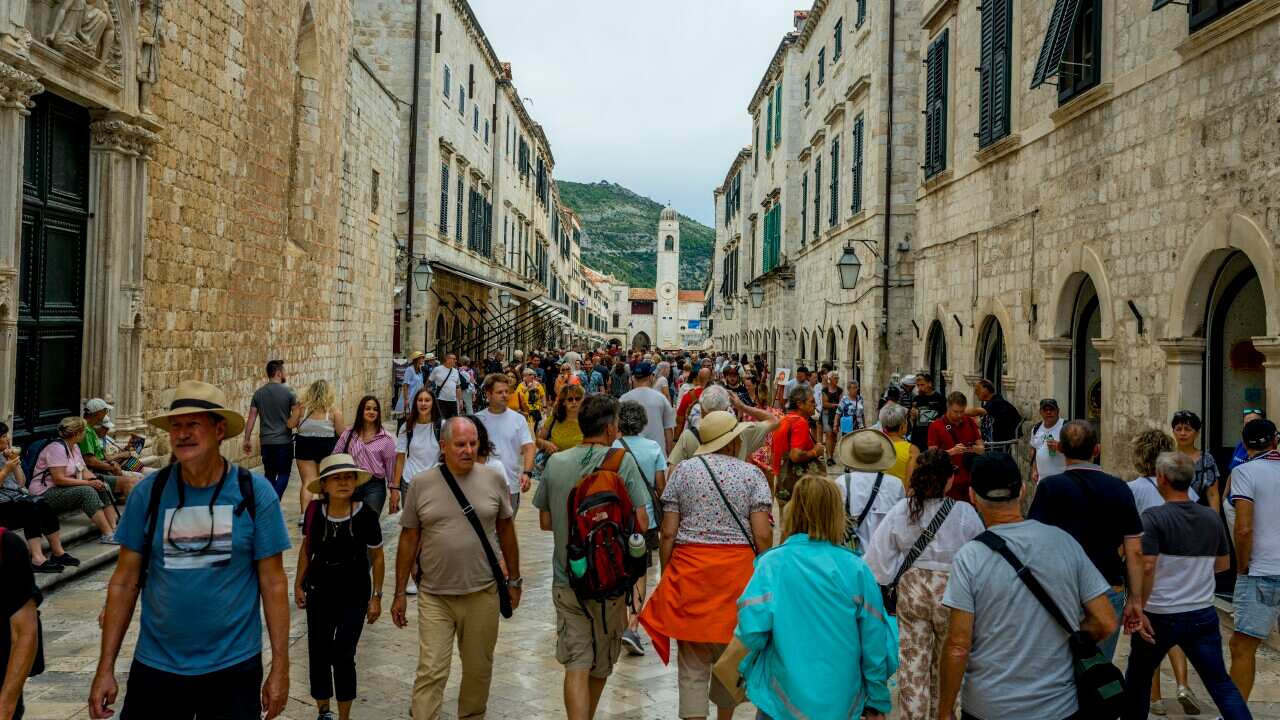
'Stay away': Why some of Europe's most popular cities are cracking down on tourism
World Tourism
Get SBS News daily and direct to your Inbox
Sign up now for the latest news from australia and around the world direct to your inbox..
Morning (Mon–Fri)
Afternoon (Mon–Fri)
By subscribing, you agree to SBS’s terms of service and privacy policy including receiving email updates from SBS.
SBS World News

Search Smartraveller
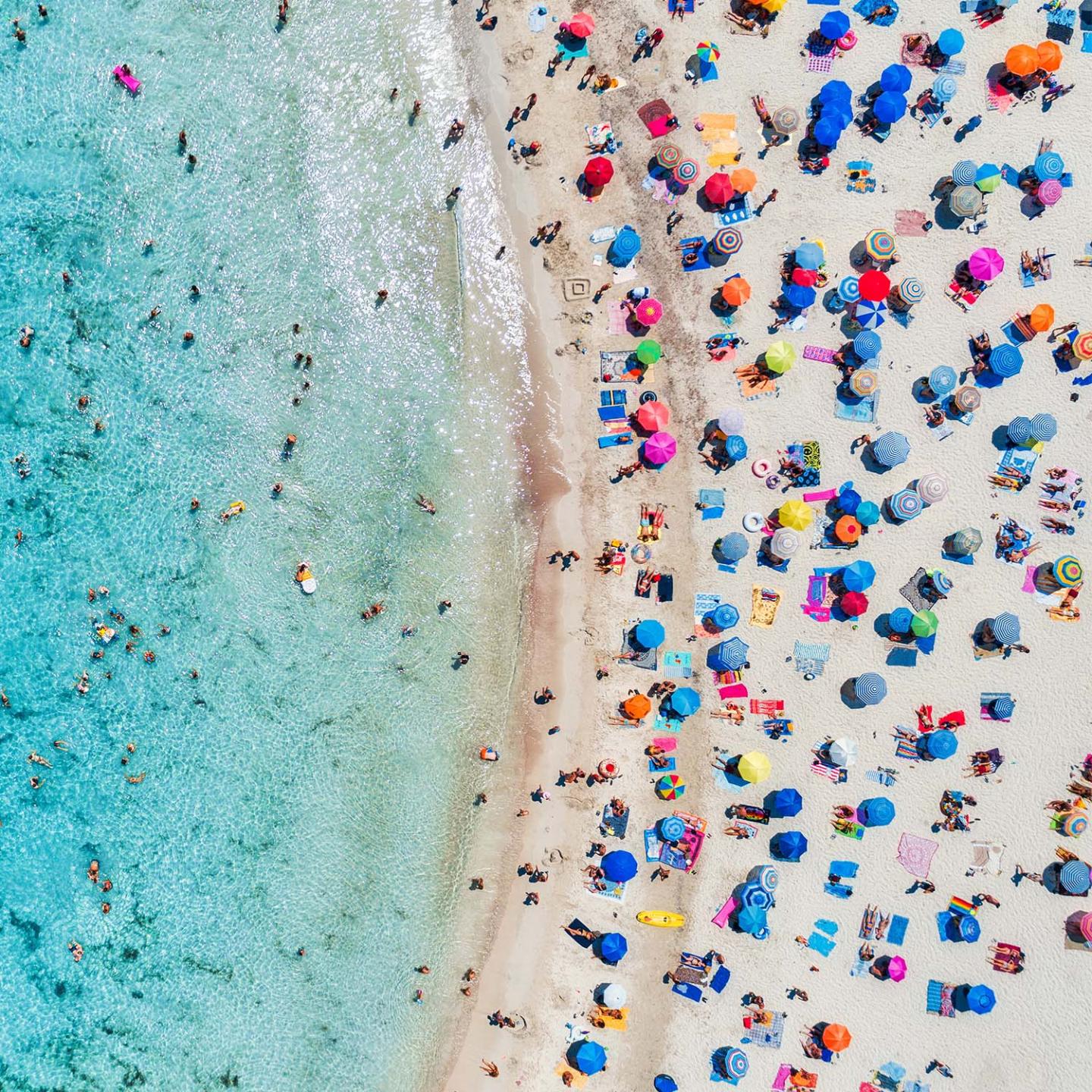
Stay safe with the latest travel advice
Everything you need to know before you go
Providing international travel advice for Australians overseas
Learn more about Smartraveller
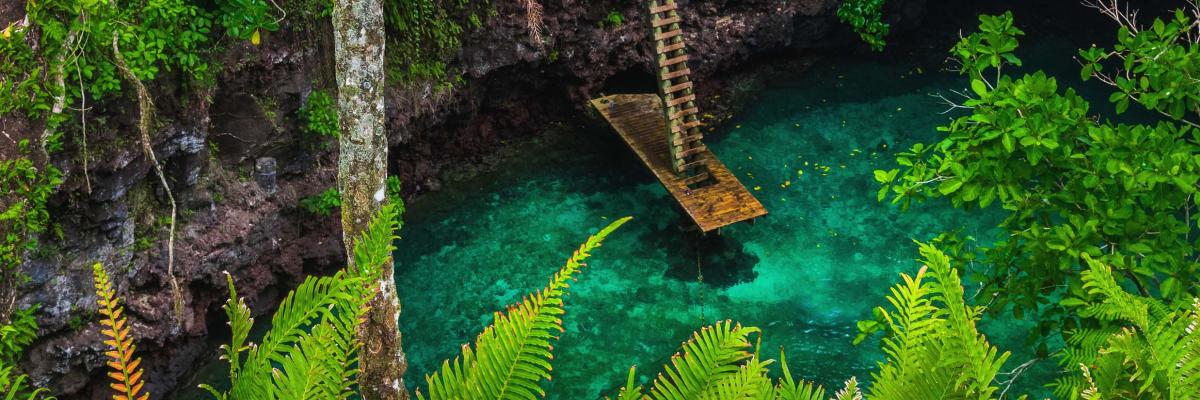
Travel Advice for Samoa
Samoa’s Ministry of Health has declared a dengue outbreak. Protect yourself against mosquito bites and use insect repellent. See the Australian Government advice on dengue before travel.
Consular assistance
The Consular Services Charter outlines the consular services and assistance provided by the Australian Government to travellers overseas. Read the Charter to understand how we can and can't help.
Consular Services Charter (PDF 195.79 KB)
Notarial services
Do you need a document legalised, or a Certificate of No Impediment for your upcoming marriage? The Australian Government can provide some notarial services.
Travel insurance
If you're going overseas, travel insurance is as important as a passport. If you can't afford travel insurance, you can't afford to travel. Read our advice, and download the CHOICE travel insurance guide before you go.
CHOICE travel insurance buying guide 2023 (PDF 3.52 MB)
News and updates
Anzac day 2024.
On 25 April, Anzac Day services will be held in major cities and at international war memorials. If you're travelling to attend a service, be prepared and know what to expect.
- Major events
Sun, sand and surgery: travelling for medical tourism
Planning to go overseas for a medical procedure? Do your research before you commit. Don't decide on cost alone.
Have adventures, not regrets
Recent research found that Smartraveller is a trusted source of advice. But it also found that Australians still take unnecessary risks when they head overseas, especially with travel insurance.
Travelling during Ramadan
Muslim countries around the world will soon be observing Ramadan. If you're visiting a Muslim country during Ramadan, research your destination before you arrive to learn what to expect.
- Middle East
Travel advice explained
Learn what our advice levels mean and how we decide what level to apply to each destination.
Passport services
With passport demand on the rise, don't leave your application to the last minute.
Allow a minimum of six weeks to get a new passport or renew one.
Coming back to Australia
Know what to do and what expect when you're heading home from your trip overseas.

Before you go...
Subscribe for updates.
Sign up to receive travel advice updates for your destination direct to your email, or manage your current subscription preferences.
Indonesia Travel Restrictions
Traveller's COVID-19 vaccination status
Travelling from Australia to Indonesia
Open for vaccinated visitors
COVID-19 testing
Not required
Not required for vaccinated visitors
Restaurants
Not required in public spaces and enclosed environments.
Documents & Additional resources
Ready to travel, find flights to indonesia, find stays in indonesia, explore more countries on travel restrictions map, destinations you can travel to now, netherlands, new zealand, philippines, south korea, united arab emirates, united kingdom, united states, know when to go.
Sign up for email alerts as countries begin to open - choose the destinations you're interested in so you're in the know.
Can I travel to Indonesia from Australia?
Most visitors from Australia, regardless of vaccination status, can enter Indonesia.
Can I travel to Indonesia if I am vaccinated?
Fully vaccinated visitors from Australia can enter Indonesia without restrictions.
Can I travel to Indonesia without being vaccinated?
Unvaccinated visitors from Australia can enter Indonesia without restrictions.
Do I need a COVID test to enter Indonesia?
Visitors from Australia are not required to present a negative COVID-19 PCR test or antigen result upon entering Indonesia.
Can I travel to Indonesia without quarantine?
Travellers from Australia are not required to quarantine.
Do I need to wear a mask in Indonesia?
Mask usage in Indonesia is not required in public spaces and enclosed environments.
Are the restaurants and bars open in Indonesia?
Restaurants in Indonesia are open. Bars in Indonesia are .
- Hotline: +6221-50919500
- Contact Our Sales Team: +62 812-8118-9105
- Email: [email protected]

Blog – InvestinAsia
The Market Entry Experts Indonesia
Indonesia Visa for Australian Citizens: A Complete Guide
- InvestinAsia Team
- August 18, 2023
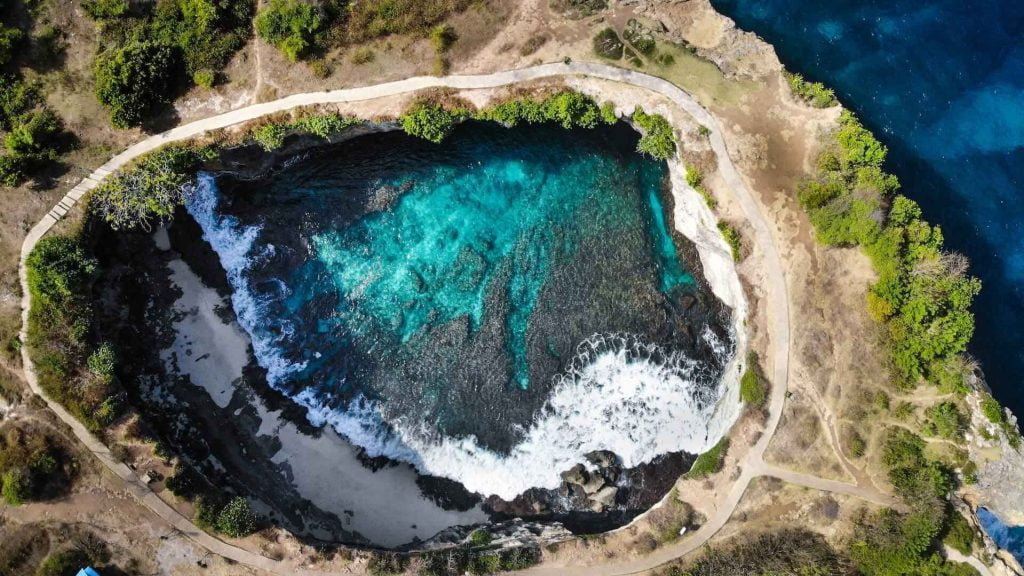
If you are an Australian citizen planning a trip to Indonesia, understanding the visa requirements is crucial. In this article, we will provide you with all the essential information about obtaining and apply for Indonesia visa , ensuring a smooth and hassle-free travel experience.
Also read: Travel to Indonesia from Australia: Your Ultimate Guide
Do You Need a Visa for Indonesia from Australia?

So, do Australians need a visa for Indonesia? Australian citizens do not need a visa to visit Indonesia for a short-term stay of up to 30 days. They can obtain a visa on arrival at the airport or at any Indonesian immigration office.
Australian citizens who wish to stay in Indonesia for longer than 30 days will need to apply for a visa at the Indonesian embassy or consulate in Australia. The type of visa that they will need will depend on the purpose of their visit.
Also read: Indonesia Visa Types: A Guide and Options for Foreigner
The Types and Indonesia Visa Requirements for Australian Citizens
Here are the types of Indonesia visa that Australian citizens can apply and it’s requirements:
B211A Visa Indonesia for Australian Citizens
The B211A visa is designed for Australian citizens planning to visit Indonesia for social or cultural purposes, such as tourism or visiting friends and relatives. To obtain a B211A visa Indonesia , Australian citizens need to meet the following requirements:
- Ensure that your passport has a validity of at least six months beyond the intended stay in Indonesia.
- A completed visa application form.
- Proof of sufficient funds to cover your expenses during your stay in Indonesia.
- A return or onward ticket.
Indonesia Visa on Arrival for Australian Citizens
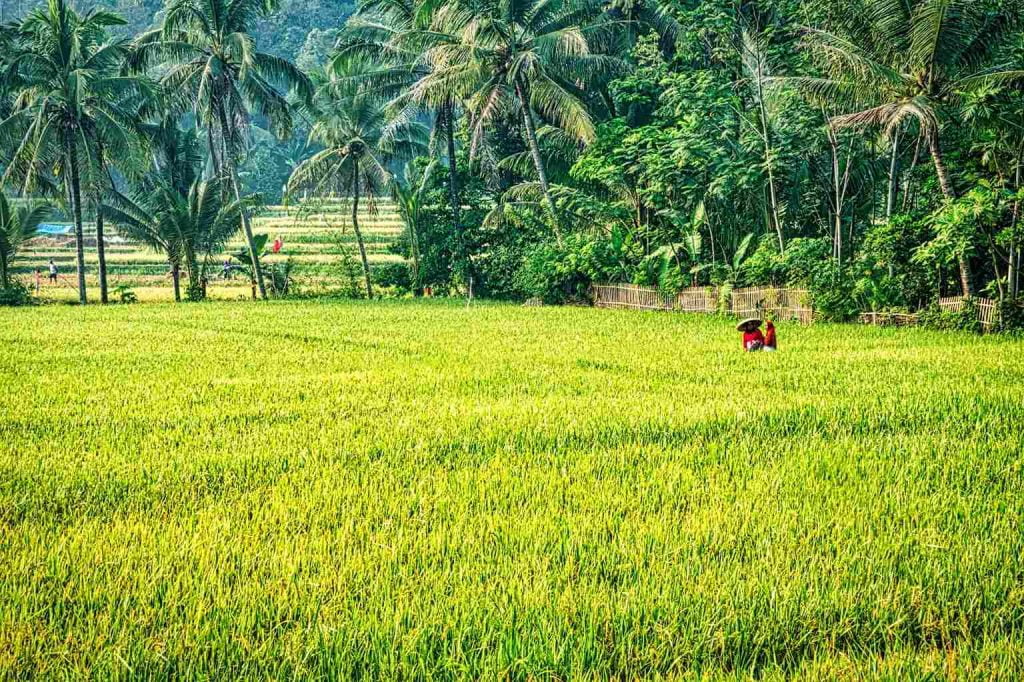
Australian citizens can also opt for a visa on arrival (VOA) when traveling to Indonesia for tourism or business purposes. The VOA allows a stay of up to 30 days and is extendable once for an additional 30 days. To obtain a Visa on Arrival Indonesia , you need to fulfill the following requirements:
- Your passport should have a minimum of six months’ validity for the visa application process.
- Proof of sufficient funds.
- A recent passport-sized photograph.
Furthermore, if you wish to stay longer, you can rely on our services to extend your visa on arrival in Indonesia .
Tourist Visa to Indonesia from Australia
If you plan to visit Indonesia for tourism purposes, you can apply for a tourist visa. This visa allows you to explore the country’s rich cultural heritage and natural beauty. The requirements for a Indonesia tourist visa may include:
- Make sure your passport is valid for at least six months when applying for an Indonesia visa.
- Completed visa application form.
- Proof of accommodation arrangements.
- Provide proof of your financial capability to support your stay in Indonesia.
Also read: Indonesia Tourist Visa for Australian Citizens: A Complete Guide
Indonesia Work Visa Requirements for Australian Citizens
If you intend to work in Indonesia, you need to apply for a work visa. The specific requirements for Indonesia work visas may vary depending on the type of employment and duration. It is advisable to consult with the Indonesian embassy or consulate in Australia to determine the appropriate work visa category and the necessary documents.
Also read: How to Get Indonesia Visa: Apply with 5 Simple Steps
Navigating the visa application process can be complex and time-consuming. InvestinAsia offers professional visa services to simplify the application process for Australian citizens traveling to Indonesia. With our expertise and knowledge of Indonesian immigration requirements, we can assist you in obtaining the necessary visa for your trip.
Whether you need a B211A visa, visa on arrival, tourist visa, or work visa, InvestinAsia can guide you through the application process. Our reliable services ensure that all required documents are prepared accurately and submitted on time, saving you valuable time and reducing the stress of the visa application process.
Have any questions about Indonesia Visa for Australian passport or need further assistance? Feel free to chat with us for personalized guidance and support.

if you are ready to start your life in indonesia or to think of discusing other options.

Talk to Our Consultants
Related Posts
Bali Visa for UK Citizens: 2024 Comprehensive Guide
Visa for Bali from South Africa: 2024 Comprehensive Guide
Indonesia Visa for US Citizens 2024: A Complete Guide
Bali Visa for US Citizens: Requirements and How to Apply
New International Travel Regulations to Enter Indonesia as of 10 November 2022
JAKARTA, 21 December 2022 - As an immediate response to recover tourism industry and relaxing the international travel restrictions, COVID-19 Task Force issued the Circular Letter of the COVID-19 Task Force Number 25 of 2022 concerning Health Protocols for International Travels during the COVID-19 Pandemic .
Coordinator of Expert Team and Spokesperson for the COVID-19 Handling Task Force, Prof. Wiku Adisasmito, stated that the adjustment to the control mechanism for international travel was urgently needed. "The COVID-19 policy must also be adaptive with the dynamics of the virus, including the dynamics of its variants that occur globally," Wiku said.
- International Travel
Here are the new international travel regulations according to the Circular Letter of the COVID-19 Task Force Number 25 of 2022 concerning Health Protocols for International Travels during the COVID-19 Pandemic
- The general requirements regarding health protocols for international travelers are as follows:
- Wearing 3 ply of fabric mask or medical grade mask, covering nose, mouth, and chin at indoor settings or any crowded situations;
- Replacing the mask regularly within every 4 hours, and dispose the waste in the proper place;
- Washing hands regularly with water and soap or hand sanitizers;
- Maintaining social distance for a minimum of 1.5 meters and avoiding crowds; and
- Keeping in mind that it is advised not to have one-way or two-way communication by telephone or in person throughout the trip using public transportation modes of land, rail, sea, river, lake, ferry, and air.
- All International travelers, both Indonesian citizens and foreign nationals, can enter Indonesia through the entry points assigned, which are:
a. Airports
- Soekarno Hatta International Airport, Banten;
- Juanda International Airport, East Java;
- Ngurah Rai International Airport, Bali;
- Hang Nadim International Airport, Riau Islands;
- Sam Ratulangi International Airport, North Sulawesi;
- Zainuddin Abdul Madjid International Airport, West Nusa Tenggara;
- Kualanamu International Airport, North Sumatra;
- Sultan Hasanuddin International Airport, South Sulawesi;
- Yogyakarta International Airport, Yogyakarta;
- Sultan Syarif Kasim II, Riau.
- Sultan Iskandar Muda, Aceh;
- Minangkabau, West Sumatra;
- Sultan Aji Muhammad Sulaiman, East Kalimantan;
- Kertajati International Airport, West Java; and
- Sentani International Airport, Papua
b. Seaports
All international seaports in Indonesia are now opened as entry points for international travel through the consideration of the Directorate General of Sea Transportation of the Ministry of Transportation.
c. Cross Border State
- Aruk, West Kalimantan;
- Entikong, West Kalimantan;
- Motaain, East Nusa Tenggara;
- Nanga Badau, West Kalimantan;
- Motamasin, East Nusa Tenggara;
- Wini, East Nusa Tenggara;
- Skouw, Papua; and
- Sota, Papua.
3. International travelers can enter Indonesia through the following conditions:
- Indonesian citizens are allowed to enter Indonesia by following the strict health protocol as mentioned in number 1.
- Foreign nationals are allowed to enter Indonesia by fulfilling the requirements as follows:
- In accordance with the provisions on immigration regulated by the ministry that administers government affairs in the fields of Law and Human Rights;
- In accordance with the agreement scheme (bilateral), such as the Travel Corridor Arrangement (TCA); and/or
- Granted special consideration/permission in writing from the Ministry/Agency.
4. Requirements for Departure Documents for international travelers from Indonesia are as follows:
- International travelers with the status of Indonesian citizens aged 18 years and above who will travel abroad from Indonesia are required to show a card/certificate (physical or digital) of receiving the third dose of COVID-19 vaccine (booster) which is shown through the PeduliLindungi app.
- The provisions on the obligation to show the card/certificate as referred to in letter a are excluded for Indonesian citizens with the following provisions:
- International travelers with the status of Indonesian citizens with special health conditions or comorbid diseases that cause them to not receive the vaccine are required to attach a doctor's certificate from the Government Hospital stating that the person concerned has not and/or cannot receive the Covid-19 vaccine; or
- International travelers with the status of Indonesian citizens who have finished carrying out COVID-19 isolation/treatment and have been declared inactive in transmitting COVID-19 but have not been able to get the third dose of vaccination (booster) must show a doctor's certificate from the Government Hospital or Ministry of Health stating that the person concerned is no longer active. actively transmit COVID-19 or COVID-19 recovery certificate.
5. Requirements for Arrival Documents for international travelers going to Indonesia are as follows:
- International travelers must download and use PeduliLindungi app before departure;
- Presenting the card/certificate (physical or digital) of receiving the second dose of COVID-19 vaccine at least 14 (fourteen) days before departure written in English, other than the language of the country of origin.
- The obligation to show proof (physical and digital) of COVID-19 vaccination certificates as requirements for entering Indonesia are excluded to:
- Foreign nationals under 18 years old; and
- International travelers with special health conditions or comorbid diseases that cause travelers cannot receive vaccines, with the requirements of presenting a doctor's certificate from the State Departure Hospital which states that the concerned person has not been and/or cannot receive COVID-19 vaccination.
- International travelers who have not received a complete dose of vaccination, have finished carrying out COVID-19 isolation or treatment, and have been declared inactive in transmitting COVID-19 with the requirement that they attach a doctor's certificate from the Government Hospital of the departure country or the ministry that carries out government affairs in the health sector on the country of departure stating that the person concerned is no longer actively transmitting COVID-19 or the COVID-19 recovery certificate;
- International travelers with the status of foreign nationals who are Diplomatic visa holders and work visas related to official visit/state officials at the ministerial level or above and foreign nationals who entered Indonesia with the Travel Corridor Arrangement scheme, according to the principle of reciprocity while implementing a strict health protocol; and
- International travelers with the status of foreign nationals who have not received the vaccine and intend to travel domestically in order to continue their journey with international flights out of Indonesian territory, are allowed not to show their COVID-19 vaccination card/certificate as long as they do not leave the airport area during transit waiting for international flights to be followed, with requirements:
- Has been permitted by the local Port Health Office to travel domestically in order to continue the journey with international flights out of the territory of Indonesia; and
- Showing the schedule of flight tickets outside Indonesia for direct transit from the departure city to the international airport in the territory of Indonesia with the final destination to the destination country.
6. COVID-19 Entry Points Health Protocols are listed as follows:
- International travelers must proceed through international travel arrival documents checking as being mentioned in no. 4.
- Upon arrival at the entry points, international travelers must undergo a COVID-19 symptom check, including a body temperature check.
- International travelers with a symptom of COVID-19 or body temperature above 37.5 degrees Celsius must undergo RT-PCR examination upon arrival with payment borne by the government for Indonesian citizen and by self-financing for foreign nationals
- International travelers without a symptom of COVID-19 and body temperature below 37.5 degrees Celsius are not required to undergo RT-PCR examination upon arrival and can continue their travel while also conducting 14 days of self health monitoring.
- International travelers conducting the RT-PCR confirmation examination as referred to in point c are allowed to continue the journey after conducting the RT-PCR confirmation examination sample and must comply with the following provisions:
- Waiting for the results of the RT-PCR confirmation examination in hotel rooms, lodging rooms, or residences; and
- Are not allowed to leave hotel rooms, lodging rooms, or residences and are not allowed to interact with other people before the results of the RT-PCR confirmation examination show negative results.
- In the event that the RT-PCR confirmation examination as referred to in point c shows a positive result, the international traveler shall be isolated/treated in accordance with the follow-up mechanism for the positive case.
- In the event that the RT-PCR confirmation examination as referred to in point c shows a negative result, the international traveler is allowed to continue the journey and it is recommended to carry out independent health monitoring of COVID-19 symptoms for 14 days by implementing strict health protocols.
7. Positive Case Follow-up Mechanism and Isolation/Treatment are as follows:
- International travelers with positive RT-PCR confirmation examination results without symptoms or experiencing mild symptoms are required to carry out isolation/treatment in isolation hotels or centralized isolation facilities set by the government or self-isolate in their own residences with isolation/treatment times as recommended by the Ministry of Health.
- International travelers with positive RT-PCR confirmation examination results accompanied by moderate or severe symptoms and/or with uncontrolled comorbidities, will be isolated/treated at a Covid-19 referral hospital with isolation/treatment time according to recommendations from doctors and recommendations from the Ministry of Health.
8. COVID-19 Vaccination Program for International Travelers are as follows:
- International travelers with the status of Indonesian citizens who have not received the COVID-19 vaccination, either the first dose, the second dose, or the third dose are required to undergo vaccination at the entry point for overseas travel after a symptom check is carried out.
- International travelers with the status of foreign nationals who are already in Indonesia and will travel, both domestically and internationally, are required to undergo vaccination through a program or mutual cooperation scheme in accordance with the provisions of the legislation.
9. Financing of all the provisions mentioned above are regulated as follows:
- The cost of RT-PCR confirmation examination at the entry point as referred to in number 5.c. for foreign nationals it is borne independently, while for Indonesian citizens it is borne by the government.
- The cost of handling COVID-19 and medical evacuation for foreign nationals is borne independently, while for Indonesian citizens it is borne by the government.
- The cost of vaccination at the entry point for international travelers with the status of Indonesian citizens as referred to in letter 7.a is borne by the government.
- In the event that the international travelers with the status of foreign nationals are unable to finance the RT-PCR confirmation examination at the entry point and isolation/treatment when the results of the RT-PCR confirmation examination show positive results, as referred to in point a and b, then the Sponsor, Ministry/Institution/State-Owned Enterprises providing the consideration of the entry permit for the foreigner can be asked for the accountability in question.
10. Other provisions are as follows:
- In regards to the results of the RT-PCR test at the entry point, a written comparison can be requested by filling out the form provided by the Port Health Office or the Ministry of Health at the expense of the inspection being borne by the international travelers.
- The implementation of the RT-PCR comparison test as referred to in point a is carried out simultaneously by the Port Health Office in 2 (two) laboratories for the purpose of SGTF comparison examination and comparative examination of RT-PCR results, namely at: Health Research and Development Agency (Balitbangkes), Cipto Mangunkusumo Central General Hospital (RSCM), 9 Gatot Soebroto Army Central Hospital (RSPAD), Bhayangkara Raden Said Sukanto Hospital (Polri Hospital) or other government laboratories (Environmental Health Engineering Center, Regional Health Laboratory, or other government reference laboratories).
- The Port Health Office of airports and international seaports facilitates international travelers requiring emergency medical services upon arrival in Indonesia in accordance with the provisions of laws and regulations.
- Every transportation mode operator at the entry point for overseas travel is required to use the PeduliLindungi app.
- Ministries/institutions/regional apparatus that carry out functions related to the international travelers must follow up this Circular Letter by issuing legal instruments that are in harmony and do not conflict with the provisions of laws and regulations.
- The legal instrument as referred to in point e is an inseparable part of this Circular Letter.
This regulation is effective from 1 September 2022 until a later date is determined. You can check the complete detail regarding this regulation on this link.
Visa Exemption Arrangement Facility and Visa on Arrival for Indonesia
- Visa Exemption Arrangement facility and Visa on Arrival for Indonesia
Furthermore, based on the Circular Letter of the Directorate General of Immigration No. IMI-0708.GR.01.01 of 2022 concerning the Ease of Immigration to Support Sustainable Tourism during the COVID-19 Pandemic effective from 23 September 2022, the Indonesian government has decided to exercise the Visa Exemption Arrangement facility and updated the list of countries eligible for Visa On Arrival (VOA) for tourism purposes.
The list of countries and special entities for Visit Visa Exemption Arrangement facility , in alphabetical order are:
- Brunei Darussalam,
- Philippines,
- Thailand, and
Visit Visa Exemption for Tourism Purpose are granted for foreign nationals at the Immigration Checkpoints as follows :
a. Airports:
1) Hang Nadim, Riau Islands; 2) Juanda, East Java; 3) Kertajati, West Java; 4) Kualanamu, North Sumatra; 5) Minangkabau, West Sumatra; 6) Ngurah Rai, Bali; 7) Sam Ratulangi, North Sulawesi; 8) Sentani, Jayapura; 9) Soekarno Hatta, Banten; 10) Sultan Aji Muhammad Sulaiman, East Kalimantan; 11) Sultan Hasanuddin, South Sulawesi; 12) Sultan Iskandar Muda, Aceh; 13) Sultan Syarif Kasim II, Riau; 14) Yogyakarta, DI Yogyakarta; 15) Zainuddin Abdul Majid, West Nusa Tenggara.
b. Seaports:
1) Achmad Yani, North Maluku; 2) Amamapare, Papua; 3) Anggrek, Gorontalo; 4) Bagan Siapi-Api, Riau; 5) Bandar Bentan Telani Lagoi, Riau Islands; 6) Bandar Seri Udana Lobam, Riau Islands; 7) Bandar Sri Setia Raja, Riau; 8) Batam Centre, Riau Islands; 9) Batu Ampar, Riau Islands; 10) Belakang Padang, Riau Islands; 11) Belawan, North Sumatra; 12) Benete, West Nusa Tenggara; 13) Benoa, Bali; 14) Biak, Papua; 15) Boom Baru, South Sumatra; 16) Celukan Bawang, Bali; 17) Cirebon, West Java; 18) Citra Tri Tunas, Riau Islands; 19) Ciwandan, Banten; 20) Dumai, Riau; 21) Dwi Kora, West Kalimantan; 22) Gunung Sitoli, North Sumatera; 23) Jambi, Jambi; 24) Jayapura, Papua; 26) Kabil, Riau Islands; 27) Kendari, Southeast Sulawesi; 28) Kota Baru, South Kalimantan; 29) Kuala Enok, Riau; 30) Kuala Langsa, Aceh; 31) Kuala Tanjung, North Sumatra; 32) Kumai, Central Kalimantan; 33) Labuan Bajo, East Nusa Tenggara; 34) Lauren Say, East Nusa Tenggara; 35) Lemar, West Nusa Tenggara; 36) Lhokseumawe, Aceh; 37) Malahayati, Aceh; 38) Manado, North Sulawesi Utara; 40) Marina Ancol, DKI Jakarta; 41) Marina Teluk Senimba, Riau Islands; 42) Merauke, Papua; 43) Muara Sabak, Jambi; 44) Nongsa Terminal Bahari, Riau Islands; 45) Nusantara, North Sulawesi; 46) Nusantara Nusantara Pare Pare, South Sulawesi; 47) Padang Bai, Bali; 48) Panarukan, East Java; 49) Pangkal Balam, Bangka Belitung; 50) Panjang, Lampung; 51) Pantoloan, Central Sulawesi; 52) Pasuruan, East Java; 53) Patimban, West Java; 54) Probolinggo, East Java; 55) Pulau Baai, Bengkulu; 56) Sabang, Aceh; 57) Samarinda, East Kalimantan; 58) Sampit, Central Kalimantan; 59) Samudera, North Sulawesi; 60) Saumlaki, Maluku; 61) Sekupang, Riau Islands; 62) Selat Lampa, Riau Islands; 63) Semayang, East Kalimantan; 64) Siak Sri Indrapura, Riau; 65) Sibolga, North Sumatra; 66) Sintete, West Kalimantan; 67) Soekarno-Hatta, South Sulawesi; 68) Sorong, Papua; 69) Sri Bayintan, Riau Islands; 70) Sri Bintan Pura, Riau Islands; 71) Sunda Kelapa, DKI Jakarta; 72) Sungai Guntung, Riau; 73) Tanjung Balai Karimun, Riau Islands; 74) Tanjung Emas, Central Jawa; 75) Tanjung Gudang, Bangka Belitung; 76) Tanjung Harapan, Riau; 77) Tanjung Intan, Central Java; 78) Tanjung Kalian, Bangka Belitung; 79) Tanjung Pandan, Bangka Belitung; 80) Tanjung Perak, East Java; 81) Tanjung Priok, DKI Jakarta; 82) Tanjung Uban, Riau Islands; 83) Tanjung Wangi, East Java; 84) Tarempa, Riau Islands; 85) Teluk Bayur, West Sumatra; 86) Teluk Nibung, North Sumatra; 87) Tembilahan, Riau; 88) Tenau, East Nusa Tenggara; 89) Tri Sakti, South Kalimantan; 90) Tual, Maluku; 91) Yos Sudarso, Maluku;
c. Cross-Border Posts:
1) Aruk, West Kalimantan; 2) Entikong, West Kalimantan; 3) Marore, North Sulawesi; 4) Miangas, North Sulawesi; 5) Mota’ain, East Nusa Tenggara; 6) Motamasin, East Nusa Tenggara; 7) Nanga Badau, West Kalimantan; 8) Serasan, Riau Islands; 9) Skouw, Papua; 10) Sota, Papua; 11) Tunon Taka, North Kalimantan; 12) Wini, East Nusa Tenggara.
Effective from 23 September 2022, below are the list of countries and special entities for VOA for tourism, in alphabetical order:
- Bosnia Herzegovina
- Brunei Darussalam
- Czech Republic
- Liechtenstein
- Netherlands
- New Zealand
- Philippines
- Saudi Arabia
- South Africa
- South Korea
- Switzerland
- Timor Leste
- Türkiye
- United Arab Emirates
- United Kingdom
- United States of America
- Vatican City
VOA for Tourism Purpose are granted for foreign nationals at the Immigration Checkpoints as follows
Immigration Checkpoints on Airports
- Hang Nadim, Riau Islands;
- Juanda, East Java;
- Kualanamu, North Sumatra;
- Ngurah Rai, Bali;
- Raja Haji Fisabilillah, Riau Islands;
- Sam Ratulangi, North Sulawesi;
- Sentani, Papua
- Soekarno Hatta, DKI Jakarta;
- Sultan Hasanuddin, South Sulawesi;
- Sultan Syarif Kasim II, Riau;
- Yogyakarta in Special Region of Yogyakarta;
- Zainuddin Abdul Madjid in West Nusa Tenggara.
Immigration Checkpoints on Seaports
- Bandar Bentan Telani Lagoi, Riau Islands;
- Bandar Seri Udana Lobam, Riau Islands;
- Batam Centre, Riau Islands;
- Belawan, North Sumatra;
- Benoa, Bali;
- Biak, Papua;
- Citra Tri Tunas, Riau Islands;
- Dumai in Riau;
- Jayapura, Papua;
- Labuan Bajo, East Nusa Tenggara;
- Lembar, West Nusa Tenggara;
- Marina Teluk Senimba, Riau Islands;
- Malundung, North Kalimantan;
- Marina Ancol, Jakarta;
- Nongsa Terminal Bahari, Riau Islands;
- Nusantara Pare-Pare, South Sulawesi;
- Padang Bai, Bali;
- Sabang, Aceh;
- Samudera, North Sulawesi;
- Saumlaki, Maluku;
- Sekupang, Riau Islands;
- Sibolga, North Sumatra;
- Soekarno-Hatta, South Sulawesi;
- Sorong, Papua;
- Sri Bintan Pura, Riau Islands;
- Sunda Kelapa, DKI Jakarta;
- Tanjung Balai Karimun, Riau Islands;
- Tanjung Emas, Central Java;
- Tanjung Pandan, Bangka Belitung;
- Tanjung Perak, East Java;
- Tanjung Priok, Jakarta;
- Tarempa, Riau Islands;
- Teluk Bayur, North Jakarta;
- Tenau, East Nusa Tenggara;
- Tual, Maluku.
Immigration Checkpoints on Cross-Border Posts
- Mota’ain, East Nusa Tenggara;
- Sota, Papua;
- Tunon Taka, North Kalimantan;
- Wini, East Nusa Tenggara.
The regulations and details for Visit Visa Exemption for Tourism Purpose and Visa On Arrival for Tourism are listed as follows:
1. International travelers must present all requirements for the VOA at the immigration counter, namely:
i. Diplomatic Passport, ii. Service Passport, or iii. General Passport;
With validity period of at least 6 (six) months;
- A return ticket or a connecting ticket to continue traveling to another country;
- Proof of non-tax revenue payment in case of applying for a VOA for tourism purpose
2. Visa Exemption Arrangement for Tourism and VOA for tourism can be used by foreign nationals to carry out tourism activities or government duties in international activities of a state or government nature;
3. In the event that the foreign national as referred to in number 3 will carry out government duties in international activities of a state or government nature, in addition to meeting the requirements as referred to in number 2 must also attach an invitation letter to attend a conference/trial/meeting issued by the related Ministry/Agency of the Republic of Indonesia;
4. VOA for Tourism can also be granted to foreign nationals holding Diplomatic Passports or Service Passports who are not citizens of the State, Government of a Special Administrative Region of a State, and Certain Entities Subject to a VOA for Tourism in the event that there is no Representative of the Republic of Indonesia in the country/place of residence or emergency/urgent activities, by examining the following requirements:
- Diplomatic Passport or Service Passport with a validity period of at least 6 (six) months,
- A return ticket or a one-way ticket to continue the journey to another country;
- Request letter from the Ministry/Agency/Agency of the Republic of Indonesia;
- Letter of approval from the Director General of Immigration;
- Proof of non-tax revenue payment for VOA for tourism; and
- Invitation letter to attend conferences/trials/meetings issued by Ministries/Institutions/Agencies of the Republic of Indonesia, in terms of the intention of visiting foreigners for government duties in international activities of a state or government nature;
5. The approval letter from the Director General of Immigration as referred to in number 4 letter d is submitted by the chairs of the Ministry/Institution/Agency of the Republic of Indonesia to the Director General of Immigration u.p. Director of Immigration Traffic by attaching:
- A request letter from the Ministry/Agency/Agency of the Republic of Indonesia containing data on foreign nationals and the reasons for the submission,
- Diplomatic Passport or Service Passport with a validity period of at least 6 (six) months, and
6. Foreign nationals holding Visa Exemption Arrangement for Tourism and VOA for tourism cannot apply for a New Stay Permit through a Visa application;
7. Foreign nationals holding Visa Exemption Arrangement for Tourism and VOA for tourism can leave the territory of Indonesia through all Immigration Checkpoints;
8. The applicable rate for a VOA for tourism is the rate for a Visa on Arrival as referred to in the Attachment to Government Regulation Number 28 of 2019 which is IDR 500,000,-;
9. Perform data reconciliation between non-tax revenue payments, use of Visit Visa stickers on VOA for tourism with immigration crossings on a daily, weekly, and monthly basis;
Passport holders outside the above listed categories in point 2, can also enter Indonesia through entry points mentioned in point 1 by applying for e-visa prior to departure.
If you are already in Indonesia and planning to depart on a domestic trip, we suggest you find an updated regulation regarding domestic travel by clicking the link here .
Second Home Visa
Foreigners can stay for 5 (five) or 10 (ten) years and carry out various activities, such as investment and others. Foreigners can also conveniently apply for a second-home visa through a website-based application( visa-online.imigrasi.go.id ).
Check here for the required documents.
E-Visa on Arrival (E-VoA)
According to the Circular Letter of the Directorate General of Immigration No. IMI-0764.GR.01.01 of 2022 concerning the Immigration Policy regarding Electronic Visit Visa Services, Visit Visa on Arrival Services, and Free Visit Visa to Support Sustainable Tourism during the Covid-19 Pandemic, as of 10 November, 2022, E-VoA program is being applied for some international travelers in order to ease their visit to Indonesia and attract more foreign travelers to come. The E-VoA program is available at 6 airports and 11 seaports across Indonesia and currently accessible to foreign nationals from 46 countries.
You can check the details regarding the E-VoA program by clicking the link here .
It is also expected for all international travelers to practice healthy habits such as washing hands frequently, wearing a mask in public places, and implementing social distancing. Kindly note that this regulation changes dynamically in order to adapt to certain circumstances. Be sure to follow us on Instagram , Facebook , Twitter , TikTok and YouTube to get an immediate update on the regulations in the future.
*Disclaimer : This article was updated on 16 January 2022. Due to the dynamic nature of travel regulations, please stay updated and confirm your itinerary with your chosen travel providers.
Suggested for you
10 Iconic Cuisines That You Must Try on Your Next Visit to Bali
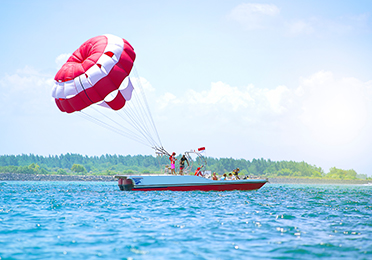
Bali's Adrenaline pumping Water Sports
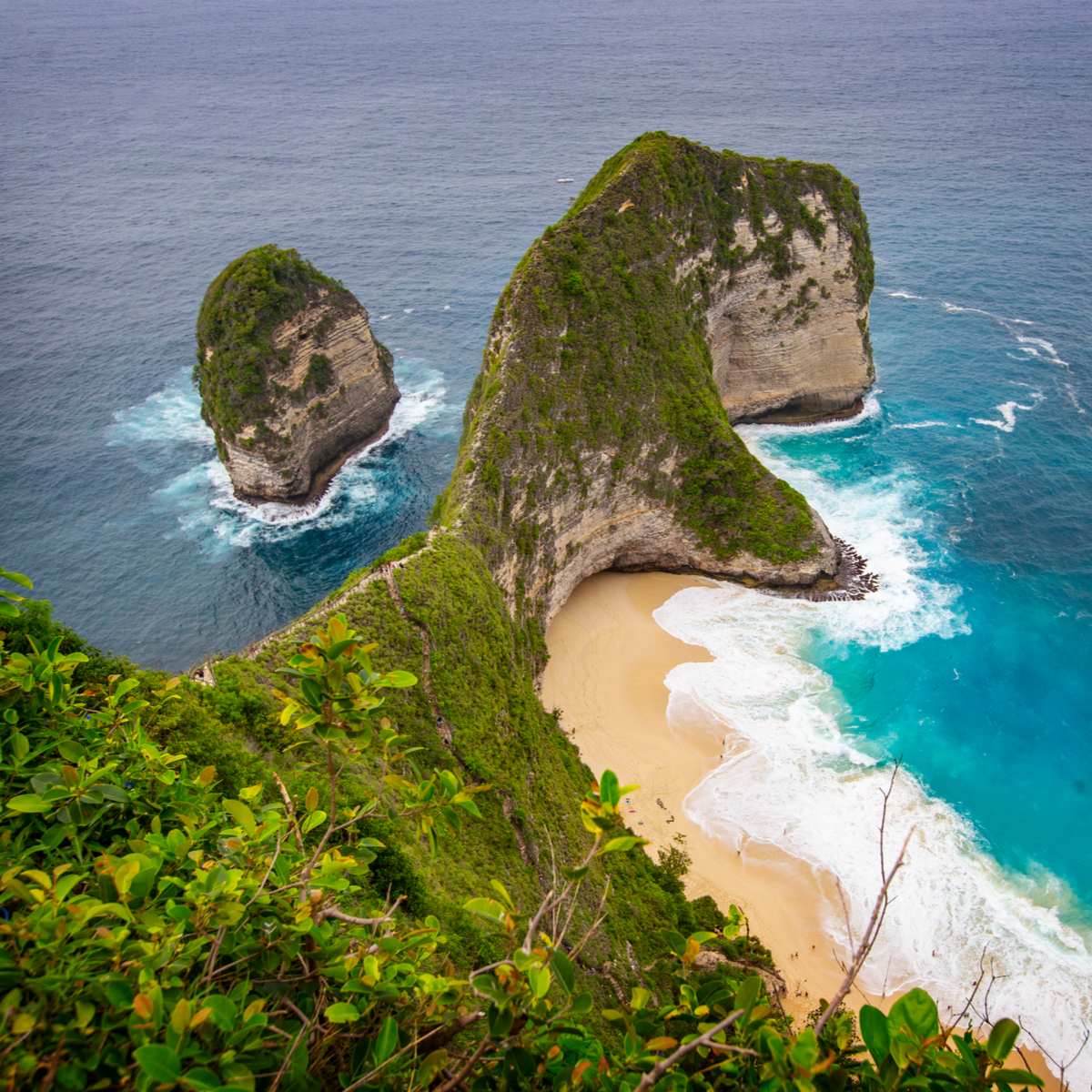
Imagine Visiting Beautiful Beaches That Match Your Chinese Zodiac
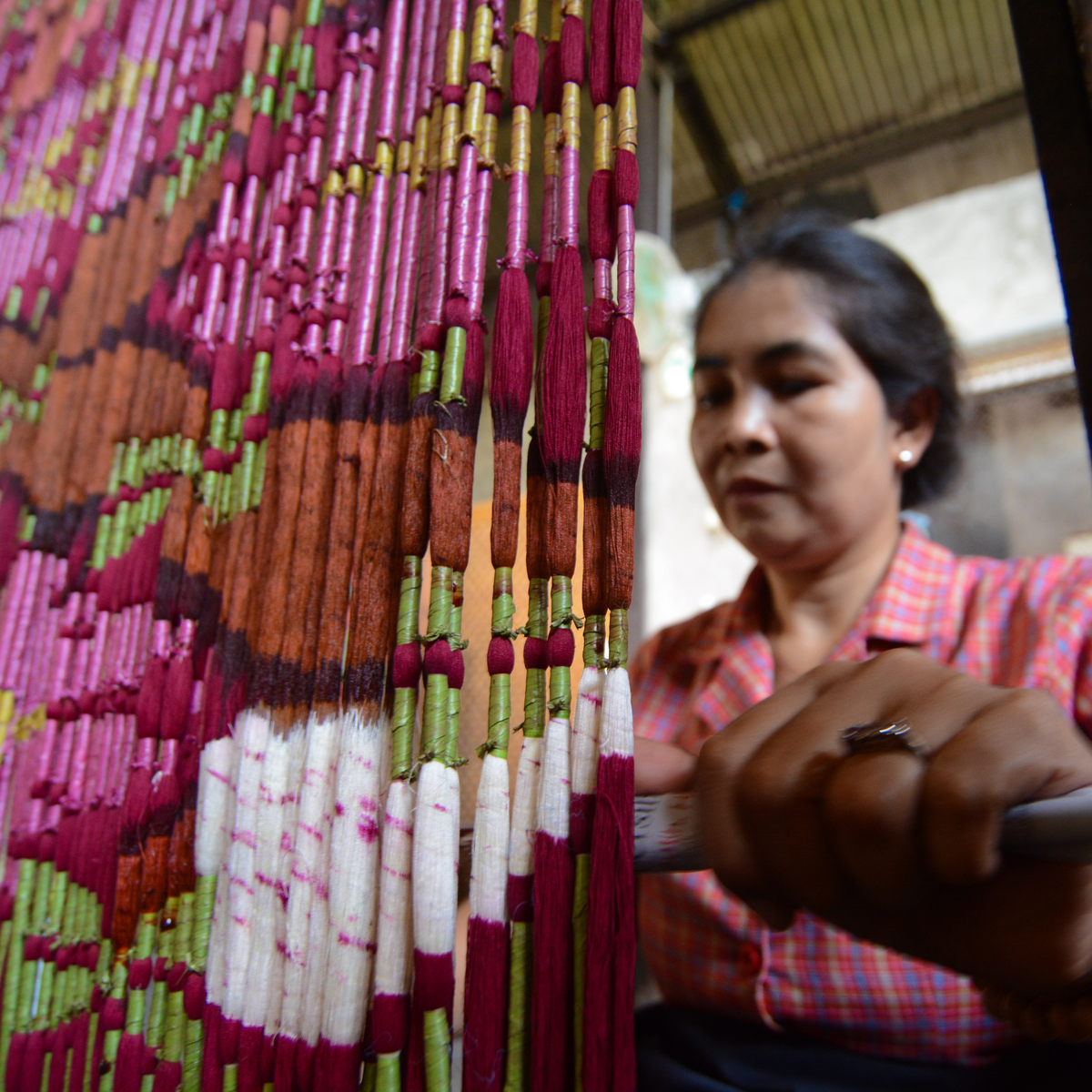
5 Enchanting Traditional Textiles from Bali
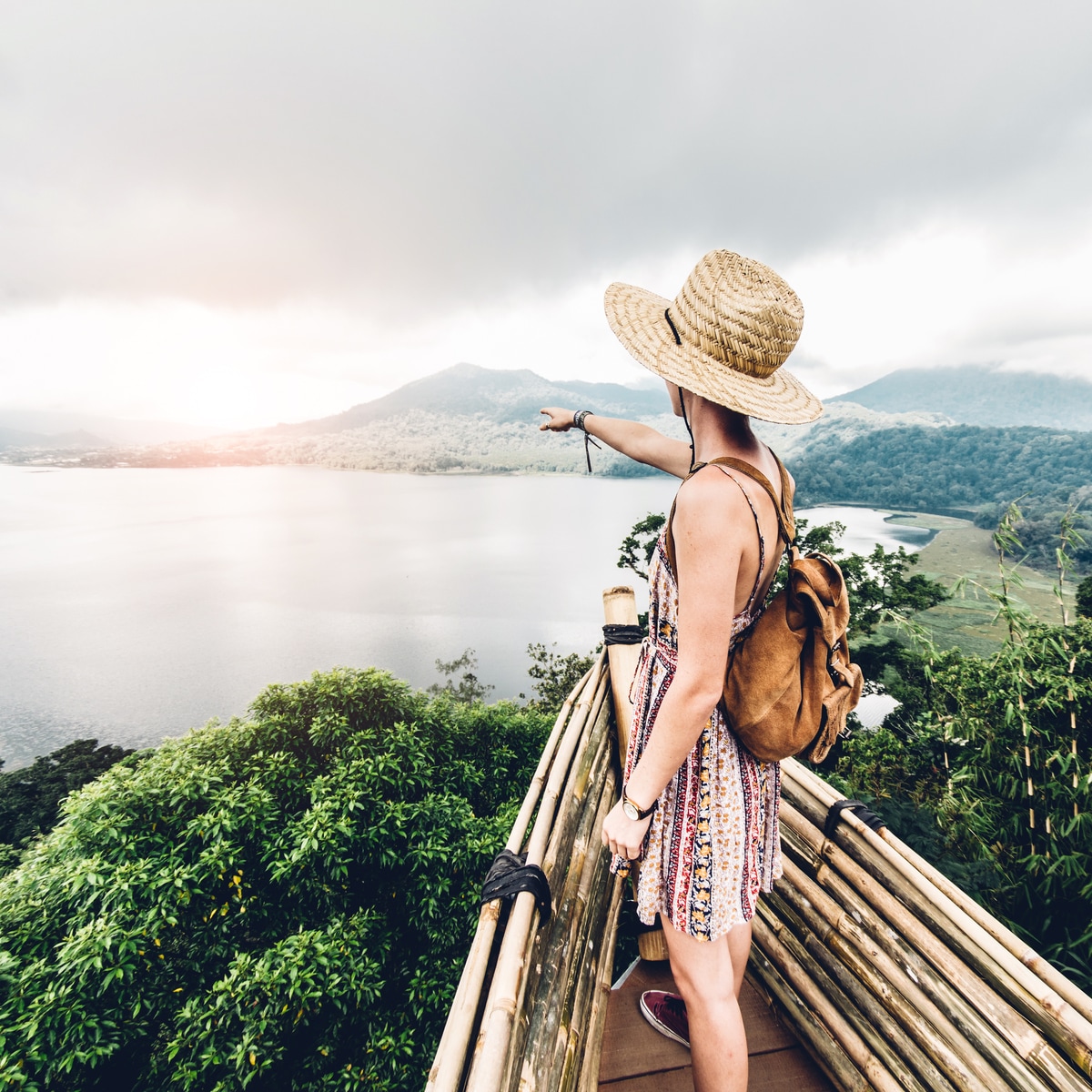
Missing Bali’s Paradise? Plan a Magical Trip with These Backpacking Ideas!

Visit our other website
This is the official website of the Ministry of Tourism, Republic of Indonesia and Creative Economy. 沪ICP备19023026号 . The contents listed on this website are intended for informational purposes rather than commercial. Any displayed sale is meant as a token of partnership and will always redirect you to our partners' sites.

- About the Handbook
Vaccination for international travellers
Ensure that travellers are up to date with routine vaccines. Also consider other vaccines based on travel itinerary, activities and risk of disease exposure.
Recently added
This page was added on 09 June 2018 .
Updates made
This page was updated on 23 October 2023 . View history of updates
Millions of Australians travel overseas every year. More than half of these trips are to destinations other than New Zealand, North America and Europe. 1
This page helps with making decisions about travel vaccines. Also check the disease-specific chapters in this Handbook for details about specific vaccines.
See also Infographic. Vaccination for international travellers .
Health risks of overseas travel
Health risks associated with international travel include exposure to:
- infective agents
- altitude and temperature extremes
- other physical, psychological and environmental hazards
- poor-quality or limited access to clean water, shelter, hygiene and sanitation facilities, and health and medical care
The level of health risks depends on factors such as:
- the traveller’s underlying physical and mental health and physiological state
- the itinerary and activities undertaken
- the duration of exposure to various hazards during travel
Travellers at increased risk of serious travel-associated infections include:
- young children and infants
- pregnant women
- people with underlying medical conditions, especially immunocompromising conditions due to disease or medical treatment
- people spending extended periods in multiple regions with poor resources or in remote areas
- people participating in events where large numbers of people will gather, such as major sporting, cultural, social or religious events
- migrant families travelling back to their region of origin to visit friends and relatives
Those travelling to visit friends and relatives are more likely to: 2
- have closer contact with local populations
- stay in remote or rural areas
- consume higher-risk food and beverages
Those travelling to visit friends and relatives are less likely to: 2,3
- recognise the health risks associated with travelling
- seek pre-travel health advice
- obtain the recommended vaccines or prophylaxis
Common infections acquired by travellers
Exposure to infectious diseases is one of the many health hazards of international travel. Some of these diseases are vaccine preventable. Although some of these diseases are present in Australia, the risk of acquiring them overseas may be higher because of:
- higher disease incidence in other countries
- increased risk of exposure from participating in certain activities while travelling
Foodborne and waterborne infections
It is common for travellers to ingest contaminated food or beverages, resulting in an illness. 4-6 Practicing safe eating and drinking habits is essential to minimise the risk of contracting food and waterborne diseases while travelling. These include treating water or only drinking bottled water, avoiding undercooked meat, and avoiding raw fruit and vegetables (unless they can be peeled or washed in safe water prior to eating). Most infections are diarrhoeal diseases due to enteric pathogens, but some are due to extra-intestinal microorganisms, such as hepatitis A virus and Salmonella enterica serotype Typhi (causing typhoid).
Vaccines are available against hepatitis A, typhoid and cholera.
Vector-borne infections
Insect-borne — especially mosquito-borne — infections, such as malaria and dengue, are important causes of fever in Australian travellers returning from endemic areas, particularly Southeast Asia and Oceania. 4,6
A dengue vaccine (Dengvaxia) is available for the prevention of secondary dengue infections (not primary prevention of initial dengue infection ) in select individuals. See Clinical advice: ATAGI statement on use of Dengvaxia® for Australians .
Japanese encephalitis occurs throughout much of Asia and the Western Pacific region, including eastern Indonesia and Papua New Guinea. 7 Yellow fever occurs only in parts of Africa and South America, 8 and tick-borne encephalitis occurs in parts of Europe and Asia. 9
Vaccines are available against Japanese encephalitis , yellow fever and tick-borne encephalitis .
Some other vector-borne diseases and parasitic (including protozoal and helminthic) diseases are also important for international travellers. Some are preventable through appropriate barrier precautions and chemoprophylaxis (for example, malaria). 9
Aerosol-borne infections
Vaccine-preventable infections transmitted by aerosols and/or droplets include: 9
- influenza (the most common vaccine-preventable infection among travellers) 10
- meningococcal disease
- varicella (chickenpox)
The incidence of measles and mumps is higher in many overseas countries, including some developed countries, than in Australia.
Tuberculosis is a rare infection in travellers. 11 Expatriates who live in endemic areas for a long time are more likely to acquire tuberculosis than short-term visitors. 12
Vaccines are available against all of these diseases.
Bloodborne and sexually transmitted infections
Some Australian travellers may be at risk from bloodborne and sexually transmissible infections, such as chlamydia, gonorrhoea, hepatitis B, hepatitis C and HIV. In some areas, healthcare workers using non-sterile medical equipment or other poor infection control practices may transmit these viruses and other bloodborne agents.
Vaccines are available against hepatitis B.
Exotic infectious agents
Travellers may be exposed to a variety of other exotic infections, such as:
- rabies from bites or scratches from rabid dogs, bats and other mammals in many countries
- schistosomiasis from exposure to water infested with the parasites, especially in Africa
- leptospirosis through activities such as rafting or wading in contaminated streams
Of these diseases, vaccines are available only against rabies.
Recommending travel vaccines
Although recommending appropriate vaccines is important, it is not the only part of a pre-travel medical consultation. Travel vaccines — those relevant for travelling — include all relevant vaccines, not just the ones that prevent diseases that most commonly occur overseas.
Do not recommend a vaccine based only on the destination country, because there is no single ‘correct’ list of vaccines for travel to any particular country.
There are 3 categories of travel vaccines:
- routinely recommended vaccines (not specific to travelling overseas)
- selected vaccines based on travel itinerary, activities and likely risk of disease exposure
- vaccines required by the International Health Regulations 2005 (IHR) or for entry into specific countries
Questions for a pre-travel medical consultation
During a pre-travel medical consultation, ask questions about the traveller’s:
- personal information, including age and whether they are pregnant or planning pregnancy
- underlying medical conditions, particularly immunocompromising conditions, and current medicines
- vaccination history (including adverse events following immunisation) and allergy history
- purpose of travel and intended activities, especially those associated with various environmental risks and hazards
- plans for travel insurance
Also ask about their itinerary in detail, including:
- date of departure and time available for vaccinations
- specific localities and routes
- rural versus urban stay
- duration of stay
- likely access to health care and other services
- likelihood of changing the planned itinerary
This information helps to tailor recommendations about preventive vaccination or chemoprophylaxis for exposure risks during the proposed trip. It also allows the clinician to advise about other appropriate preventive health measures (for example, food and water precautions, avoiding bites from mosquitoes or other arthropods) and about managing possible health conditions during travel.
Organisational requirements for vaccination
Some overseas organisations, such as schools, colleges and universities, require evidence of vaccination or immunity against some vaccine-preventable diseases, such as measles and meningococcal disease. Consider these requirements when planning and scheduling vaccines before departure.
Routinely recommended vaccines (not specific to travelling overseas)
Vaccinate all prospective travellers according to the recommended vaccination schedule appropriate for their age, underlying health conditions, occupation and lifestyle. Vaccines might include, for example, pneumococcal polysaccharide vaccine for an older person, or hepatitis B vaccine for a first aid officer.
Also ensure that all children are vaccinated according to the National Immunisation Program schedule. In exceptional circumstances, give the National Immunisation Program vaccines at the minimum age rather than the recommended age (see Table. Minimum acceptable age for the 1st dose of scheduled vaccines in infants in special circumstances ). Children vaccinated using the minimum age rather than the recommended age may need extra vaccine doses to ensure adequate protection. Observe the minimum interval requirements between doses (see Table. Minimum acceptable dose intervals for children <10 years of age ). The chances of being exposed to some diseases, such as measles and mumps, may be greater during overseas travel, even to other developed countries.
For some itineraries, it may be appropriate for the traveller to receive some booster doses earlier than the routine recommended time. An example may be diphtheria-tetanus booster.
Diphtheria, tetanus and pertussis
Vaccinate adult travellers against tetanus before departure, particularly if:
- their risk of sustaining a tetanus-prone wound is high
- there could be delays in accessing health services where they can receive tetanus toxoid boosters safely, if required
Offer dTpa vaccine during a pre-travel consultation if the traveller has never received a dose of dTpa . This provides protection against pertussis (see Pertussis ).
For high-risk travel, consider giving a booster dose of either dTpa or dT vaccine if more than 5 years have passed (see Tetanus ).
Hepatitis B
Most Australian children born since 2000 have been vaccinated against hepatitis B under the National Immunisation Program or state and territory school-based vaccination programs.
Hepatitis B vaccine is recommended for long-term or frequent travellers to regions of intermediate or high endemicity of hepatitis B, including:
- Central and South America
This is because travellers may be exposed to hepatitis B virus through bloodborne routes (including during emergency medical or dental procedures) or sexual routes. According to 1 survey, about half of Australian travellers who spent at least 3 nights in Southeast or East Asia participated in at least 1 activity that had a risk of hepatitis B transmission. 13
See also Hepatitis B .
Influenza and pneumococcal disease
Older travellers and those with any relevant underlying medical or behavioural risk factors should receive pneumococcal vaccine. See Pneumococcal disease for more details.
Consider influenza vaccine for all travellers, especially if they are travelling to a region during its influenza season. Influenza vaccine is particularly relevant if:
- there is an influenza epidemic at the traveller’s destination
- the person is travelling in a large tourist group, especially one that includes older people
- the person is travelling on cruises, where people are relatively confined for days to weeks
See also Influenza.
Measles, mumps and rubella
Inadequately vaccinated young adult travellers are responsible for most current measles outbreaks in Australia. This occurs when they acquire the infection overseas and bring it back to Australia. Some countries, regions or communities — including developed countries — have a higher incidence of measles and mumps than Australia. 9
Australians born during or since 1966 who have not received the recommended 2 doses of MMR (measles-mumps-rubella)–containing vaccines are recommended to receive MMR vaccine before travelling. This also applies to infants 6–12 months old travelling to areas with measles outbreaks or where measles is endemic . The exception is for pregnant women, because MMR is a live vaccine and is contraindicated in pregnancy.
People born before 1966 do not need to receive measles-containing vaccine (unless serological evidence indicates that they are not immune). This is because circulating measles virus and disease were prevalent before 1966, so most people would have acquired immunity from natural infection .
However, confirmed cases of measles have occurred in people born before 1966. 14 If in doubt about a person’s immunity, it may be faster and easier to vaccinate the person than conduct serological testing . See Serological testing for immunity to measles .
See also Measles .
Unvaccinated travellers are recommended to receive varicella vaccine if they either:
- have not had clinical disease, or
- have an uncertain history of clinical disease and serology shows a lack of immunity
The exception is for pregnant women, because varicella vaccine is a live vaccine and is contraindicated in pregnancy.
See also Varicella .
Meningococcal disease
Vaccination against meningococcal serogroups A, C, W-135, Y and B is recommended for certain age and population groups who are at increased risk of meningococcal disease.
In addition, MenACWY (quadrivalent meningococcal) vaccine is recommended for people who are:
- planning travel to, or living in, parts of the world where epidemics of serogroup A, C, W-135 or Y meningococcal disease occur, particularly the ‘meningitis belt’ of sub-Saharan Africa 15
- planning travel to mass gatherings, such as pilgrims travelling to the Hajj in Saudi Arabia
Seek up-to-date epidemiological information to determine whether a traveller needs meningococcal vaccination. See Accessing up-to-date travel information.
The Saudi Arabian authorities require that all pilgrims travelling to Mecca (for the Hajj or Umra) have evidence of recent vaccination with the quadrivalent meningococcal vaccine. 16 See Requirements for travellers to Mecca and Accessing up-to-date travel information .
See also Meningococcal disease .
Poliomyelitis
Ensure that all travellers are age-appropriately vaccinated against polio (see Poliomyelitis ).
If the person is travelling to a country where wild poliovirus is still circulating, they should receive inactivated poliovirus ( IPV ) vaccine if they have not completed a 3-dose primary course of any polio vaccine. Travellers who have completed the primary course should receive a single booster dose.
The World Health Organization (WHO) Global Polio Eradication Initiative website website has an up-to-date list of polio-affected countries.
Documented evidence of polio vaccination is not routinely required for travellers under the International Health Regulations. However, documented evidence of vaccination may be temporarily required according to WHO recommendations in response to new evidence of the spread of wild poliovirus (see Vaccines required by the International Health Regulations or for entry into specific countries and Documentation and certificates ).
International polio epidemiology and associated travel requirements can change. Check the Australian Government Department of Health website for current recommendations for Australian travellers .
Ensure that all travellers are age-appropriately vaccinated against COVID-19. Foreign governments may require evidence of COVID-19 vaccination before a traveller is allowed to enter. The Australian-issued International COVID-19 Vaccination Certificate is a secure way to prove COVID-19 vaccination history that has been developed to meet agreed international travel standards. Parents and carers of children <14 years of age, adolescents ≥14 years of age and adults can get a copy of their COVID-19 vaccination certificate at any time:
- using their Medicare online account through myGov
- through the Medicare Express Plus mobile app
- by calling 1800 653 809 (free call)
See also COVID-19 .
Vaccines based on travel itinerary, activities and likely risk of disease exposure
Use a risk assessment approach when recommending travel vaccines. Weigh the potential risks of disease exposure and protective benefits from vaccination against potential adverse effects, and the non-financial and financial costs of vaccination.
Prioritise vaccines for diseases that are:
- common and of significant impact, such as influenza and hepatitis A
- less common, but have severe potential adverse outcomes, such as Japanese encephalitis and rabies
Consider booster doses, where appropriate (see disease-specific chapters in this Handbook for recommendations). If the person is departing for travel soon, consider an accelerated schedule, if appropriate, such as for hepatitis B vaccine or the combination hepatitis A-hepatitis B vaccine (see Hepatitis A and Hepatitis B ). Although immunity may be established sooner with the accelerated schedule, people who receive an accelerated schedule need another dose about a year later to complete the course and ensure long-term protection.
Most travellers do not need cholera vaccine. 16,17 The risk of a traveller acquiring cholera is very low if they avoid contaminated food and water.
No country requires travellers to have certification of cholera vaccination. No country has official entry requirements for cholera vaccination
See also Cholera .
Hepatitis A
Hepatitis A vaccine is recommended for all travellers ≥1 year of age travelling to moderately or highly endemic countries (including all developing countries). The exceptions are people who have evidence of natural immunity after previous infection .
Normal human immunoglobulin is no longer used to protect travellers against hepatitis A.
See also Hepatitis A .
Japanese encephalitis
While now considered an emerging disease in Australia, Japanese Encephalitis is more likely in travellers to endemic regions overseas. 18 Japanese encephalitis ( JE ) vaccine is recommended for travellers spending a month or more in endemic areas in Asia, Papua New Guinea or the outer islands of Torres Strait during the JE virus transmission season.
Consider JE vaccination for shorter-term travellers, particularly if:
- travel is during the wet season
- travel may be repeated
- the person will spend a lot of time outdoors
- the person’s accommodation has no air-conditioning, screens or bed nets
Check a reputable source before travel for information about JE virus activity — for example, Health Information for International Travel (the ‘Yellow Book’) . 19
A traveller’s overall risk of acquiring JE in these JE - endemic countries is likely to be low (<1 case per 1 million travellers). Determine the specific risk according to the: 17
- season of travel
- regions visited
- duration of travel
- extent of outdoor activity
- extent to which the person avoids mosquito bites
See also Japanese encephalitis .
Before travel to rabies- endemic regions, advise people about:
- the risk of rabies infection
- avoiding close contact with wild, stray and domestic animals — especially dogs, cats, monkeys and bats
- the importance of appropriate immediate wound care of all animal bites and scratches
See also Rabies and other lyssaviruses, including Australian bat lyssavirus .
Recommendations for rabies vaccination as pre-exposure prophylaxis
When deciding whether to give a pre-travel prophylactic rabies vaccination, assess the:
- likelihood of exposure to potentially rabid animals
- access to appropriate health care and availability of post-exposure prophylaxis , including rabies immunoglobulin , should there be an at-risk exposure
- timeliness of access to health care after exposure
Use a lower threshold for recommending rabies pre-exposure prophylaxis for children travelling to endemic areas.
Benefits of vaccination as pre-exposure prophylaxis
Pre-travel rabies vaccination:
- ensures that the traveller has received a safe and efficacious vaccine
- simplifies the management of a subsequent exposure because the person will need fewer doses of vaccine
- means that rabies immunoglobulin — which is often extremely expensive, and difficult or even impossible to obtain in many developing countries — is not needed
- reduces the urgency of post-exposure prophylaxis

Tick-borne encephalitis
Tick-borne encephalitis (TBE) is caused by a tick-borne RNA flavivirus. The disease may involve the central nervous system. TBE is prevalent in parts of central and northern European temperate regions, and across northern Asia. Travellers are at risk when hiking or camping in forested areas in endemic regions during the summer months.
Safe and effective vaccines are available. Vaccination is recommended only for people with a high risk of exposure.
TBE vaccine is not registered in Australia, but a small stock of vaccine may be available for use under the Special Access Scheme .
Tuberculosis
Vaccination with BCG (bacille Calmette–Guérin) vaccine is generally recommended for tuberculin-negative children <5 years of age who will be staying in high-risk countries for an extended period (3 months or longer).
Vaccinating older children and adults appears to be less beneficial. However, consider vaccinating tuberculin-negative children aged ≥5 years but <16 years who may be living or travelling for long periods in high-risk countries.
A high-risk country is one that has a tuberculosis incidence of >40 per 100,000 population.
For travellers who need BCG vaccine, consider the following precautions when scheduling their vaccination visits:
- If possible, give BCG vaccine at least 3 months before the person will arrive in an endemic area.
- Give other live viral vaccines (for example, MMR , varicella, yellow fever) at the same time or with a minimum 4-week interval after BCG vaccination.
- A tuberculin skin test (TST; Mantoux), performed by trained and accredited healthcare practitioners, is recommended before receiving BCG vaccine for all individuals (except infants aged <6 months).
- People may suppress reactions to tuberculin for 4–6 weeks after viral infections or live viral vaccines, particularly measles infection and measles-containing vaccines.
State and territory tuberculosis services can provide tuberculin skin tests and BCG vaccine.
See also Tuberculosis .
Typhoid vaccine may be recommended for travellers ≥2 years of age travelling to endemic regions, including:
- the Indian subcontinent
- most Southeast Asian countries
- several South Pacific nations, including Papua New Guinea
This advice is also relevant for those travelling to endemic regions to visit friends and relatives.
Inactivated parenteral and live oral typhoid vaccine formulations are available.
See also Typhoid fever .
Yellow fever
Yellow fever vaccine is recommended for all people ≥9 months of age travelling to, or living in, an area with a risk of yellow fever virus transmission. 20
To minimise the risk of introducing yellow fever, some countries require documented evidence of yellow fever vaccination for entry, in line with the International Health Regulations (see Vaccines required by the International Health Regulations or for entry into specific countries ).
When assessing the need for yellow fever vaccination, consider:
- the risk of the person being infected with yellow fever virus
- country entry requirements
- individual factors such as age, pregnancy and underlying medical conditions
Vaccination is generally not recommended for travel to areas with a low probability of yellow fever virus exposure — that is:
- where human yellow fever cases have never been reported
- where evidence suggests only low levels of yellow fever virus transmission in the past
However, consider vaccination for a small subset of travellers to lower-risk areas who are at increased risk of exposure to mosquitoes or who are unable to avoid mosquito bites. 20
People aged ≥60 years are at increased risk of severe adverse events after primary yellow fever vaccination. Weigh the adverse effects of vaccinating people in this age group against the potential for yellow fever virus exposure and, in turn, the benefits of vaccination. 17
See also Yellow fever .
Booster doses
Most people do not need a booster dose of yellow fever vaccine. A single dose induces protective antibody levels that last for many decades. However, certain people are recommended to receive a booster if their last dose was more than 10 years ago and they are at ongoing risk of yellow fever virus infection . See Yellow fever .
Vaccines required by the International Health Regulations or for entry into specific countries
Yellow fever requirements.
The International Health Regulations require yellow fever vaccination for travelling in certain circumstances. This is to:
- protect travellers who are likely to be exposed to yellow fever
- stop importation of the virus into countries that have the relevant vectors (see Yellow fever ).
Some countries may require documented evidence of yellow fever vaccination as a condition of entry or exit (see Planning and documenting vaccines ). This includes countries that do not currently have yellow fever circulating.
Australia’s yellow fever travel requirements are detailed in the Australian Government Department of Health’s yellow fever fact sheet .
Contact the relevant embassies or consulates in Australia to confirm the entry requirements for yellow fever vaccination for the countries a traveller intends to enter or transit through.
Requirements for travellers to Mecca
Each year, Saudi Arabia’s Ministry of Health publishes the requirements and recommendations for entry visas for travellers on pilgrimage to Mecca (Hajj and Umra). 16
For pilgrims travelling directly from Australia, only evidence of MenACWY vaccination is currently mandatory. However, check the current requirements when advising prospective Hajj and Umra pilgrims (see Meningococcal disease and Accessing up-to-date travel information ).
Temporary requirements
The International Health Regulations may temporarily introduce requirements for other vaccine-preventable diseases in response to changes in disease epidemiology that are of international health concern. An example is for polio vaccination.
Because country vaccination requirements are subject to change at any time, confirm all current vaccination requirements for the countries a traveller intends to enter or transit through before travel. See Poliomyelitis and Accessing up-to-date travel information .
Planning and documenting vaccines
Ideally, start vaccination courses early enough before departure to allow:
- monitoring of any possible adverse events
- time for adequate immunity to develop
Requirements for multiple vaccines
A traveller may need multiple vaccines before they depart. Apply the standard recommendations and precautions when giving multiple vaccines (see Administration of vaccines ).
A traveller may need more than 1 clinic visit if they need multiple vaccines or doses (for example, rabies pre-exposure prophylaxis or hepatitis B vaccine). Pay special attention to scheduling of these visits, and consider:
- dose interval precautions (for example, for multiple live vaccines)
- requirements for pre-vaccination tests (for example, tuberculin skin test)
- potential interference by some antimalarials, if relevant (for example, rabies vaccine)
Documentation and certificates
It is important to document travel vaccines:
- in the clinic’s record
- in the traveller’s record that they can carry with them
- on the Australian Immunisation Register
The record should also include all the other routinely recommended vaccines that the traveller has ever received.
For yellow fever vaccination, a traveller needs to have an International Certificate of Vaccination or Prophylaxis (ICVP), which only Yellow Fever Vaccination Centres can provide under the International Health Regulations (see Yellow fever ).
Travellers may also need an ICVP for other vaccine-preventable diseases, such as polio, based on temporary recommendations.
See also Accessing up-to-date travel information .
Vaccinating travellers with special risk factors
See Vaccination for women who are planning pregnancy, pregnant or breastfeeding , Vaccination for people who are immunocompromised and the disease-specific chapters in this Handbook for recommendations for travellers who are pregnant or immunocompromised.
Accessing up-to-date travel information
International travellers’ health risks constantly change. Up-to-date information, and knowledge of the changing epidemiology and current outbreaks of infectious and emerging diseases are essential. Reliable online information sources include:
- World Health Organization (WHO) for disease outbreak news, and its Travel and health section for specific advice on travel and health, including travel vaccination recommendations
- Travelers’ health , United States Centers for Disease Control and Prevention (CDC)
- Travel health information , Australian Government Department of Health
- Smartraveller , the Australian Government’s travel advisory and consular information service, which provides up-to-date advice about health, safety and other risks of specific destinations for Australian travellers
The following resources have comprehensive technical advice on international travel and health, including vaccination:
- the latest edition of WHO’s International travel and health
- the CDC’s Health Information for International Travel (the ‘Yellow Book’)
- Australian Bureau of Statistics. 3401.0 – Overseas arrivals and departures, Australia, Mar 2018 (accessed May 2018).
- Paudel P, Raina C, Zwar N, et al. Risk activities and pre-travel health seeking practices of notified cases of imported infectious diseases in Australia. Journal of Travel Medicine 2017;24(5):tax044.
- Heywood AE, Watkins RE, Iamsirithaworn S, Nilvarangkul K, MacIntyre CR. A cross-sectional study of pre-travel health-seeking practices among travelers departing Sydney and Bangkok airports. BMC Public Health 2012;12:321.
- Chen LH, Leder K, Barbre KA, et al. Business travel-associated illness: a GeoSentinel analysis. Journal of Travel Medicine 2018;25.
- Angelo KM, Kozarsky PE, Ryan ET, Chen LH, Sotir MJ. What proportion of international travellers acquire a travel-related illness? A review of the literature. Journal of Travel Medicine 2017;24.
- Freedman DO, Weld LH, Kozarsky PE, et al. Spectrum of disease and relation to place of exposure among ill returned travelers. New England Journal of Medicine 2006;354:119-30.
- Halstead SB, Hills SL, Dubischar K. Japanese encephalitis vaccines. In: Plotkin SA, Orenstein WA, Offit PA, Edwards KM, eds. Plotkin's vaccines. 7th ed. Philadelphia, PA: Elsevier; 2018.
- Staples JE , Monath TP, Gershman MD, Barrett AD. Yellow fever vaccines. In: Plotkin SA, Orenstein WA, Offit PA, Edwards KM, eds. Plotkin's vaccines. 7th ed. Philadelphia, PA: Elsevier; 2018.
- World Health Organization (WHO). Chapter 6: Vaccine-preventable diseases and vaccines . In: International travel and health. Geneva: WHO; 2017.
- Steffen R. Travel vaccine preventable diseases-updated logarithmic scale with monthly incidence rates. Journal of Travel Medicine 2018;25.
- Denholm JT, Thevarajan I. Tuberculosis and the traveller: evaluating and reducing risk through travel consultation. Journal of Travel Medicine 2016;23.
- Lachish T, Tenenboim S, Schwartz E. 35 - Humanitarian Aid Workers. In: Keystone JS, Kozarsky PE, Connor BA, et al., eds. Travel Medicine (Fourth Edition). London: Elsevier; 2019. (Accessed 6 July 2023). https://www.sciencedirect.com/science/article/pii/B9780323546966000355
- Leggat PA, Zwar NA, Hudson BJ. Hepatitis B risks and immunisation coverage amongst Australians travelling to Southeast Asia and East Asia. Travel Medicine and Infectious Disease 2009;7:344-9.
- Winkler NE, Dey A, Quinn HE, et al. Australian vaccine preventable disease epidemiological review series: measles, 2012-2019. Commun Dis Intell (2018) 2022;46.
- World Health Organization (WHO). Epidemic meningitis control in countries of the African meningitis belt, 2017. Weekly Epidemiological Record 2018;93:173-84.
- World Health Organization (WHO). International travel and health: health conditions for travellers to Saudi Arabia for the pilgrimage to Mecca (Hajj) . 2017 (accessed May 2018).
- Freedman DO, Chen LH. Vaccines for International Travel. Mayo Clinic Proceedings 2019;94:2314-39.
- Furuya-Kanamori L, Gyawali N, Mills DJ, et al. The Emergence of Japanese Encephalitis in Australia and the Implications for a Vaccination Strategy. Trop Med Infect Dis 2022;7.
- Hills SL, Rabe IB, Fischer M. Infectious diseases related to travel: Japanese encephalitis . In: CDC yellow book 2018: health information for international travel. New York: Oxford University Press; 2017.
- World Health Organization (WHO). International travel and health (accessed Apr 2018).
Page history
Minor updates to clinical guidance around routinely recommended vaccines (not specific to travelling overseas), including the addition of advice regarding COVID-19.
Editorial update to reflect changes to pneumococcal vaccine recommendations for older adults and people with medical risk factors.
Guidance on vaccination of travellers against measles, mumps and rubella updated to reflect advice in the Measles chapter.
Help us improve the Australian Immunisation Handbook
Printed content may be out of date. For up to date information, always refer to the digital version:
Subscribe to receive notifications regarding updates to the Australian Immunisation Handbook and changes to immunisation policy.
Help us improve
We are always looking for ways to improve our website, the NICC and mobile app.
Provide feedback
Acknowledgement
The Department of Health and Aged Care acknowledges First Nations peoples as the Traditional Owners of Country throughout Australia, and their continuing connection to land, sea and community. We pay our respects to them and their cultures, and to all Elders both past and present.
© Commonwealth of Australia | Department of Health and Aged Care
Link , share or bookmark directly to this section of the page.
Update April 12, 2024
Information for u.s. citizens in the middle east.
- Travel Advisories |
- Contact Us |
- MyTravelGov |
Find U.S. Embassies & Consulates
Travel.state.gov, congressional liaison, special issuance agency, u.s. passports, international travel, intercountry adoption, international parental child abduction, records and authentications, popular links, travel advisories, mytravelgov, stay connected, legal resources, legal information, info for u.s. law enforcement, replace or certify documents.
Before You Go
Learn About Your Destination
While Abroad
Emergencies
Share this page:
Travel Advisory July 24, 2023
Indonesia - level 2: exercise increased caution.
Reissued with obsolete COVID-19 page links removed.
Exercise increased caution in Indonesia due to terrorism and natural disasters. Some areas have increased risk. Read the entire Travel Advisory.
Do Not travel to:
- The provinces of Central Papua (Papua Tengah) and Highland Papua (Papua Pegunungan) due to civil unrest.
Terrorists continue plotting possible attacks in Indonesia. Terrorists may attack with little or no warning, targeting police stations, places of worship, hotels, bars, nightclubs, markets/shopping malls, and restaurants.
Natural disasters such as earthquakes, tsunamis or volcanic eruptions may result in disruptions to transportation, infrastructure, sanitation, and the availability of health services.
Demonstrations occur frequently and have the potential to become violent. Avoid demonstrations and crowds.
Indonesia’s revised criminal code, which takes effect January 2026, includes penalties for defamation, blasphemy, cohabitation, and sex outside of marriage. It is unclear how Indonesian authorities will implement the revised criminal code.
Read the country information page for additional information on travel to Indonesia.
If you decide to travel to Indonesia:
- Monitor local media for breaking events and be prepared to adjust your plans.
- Visit the websites for Badan Geologi (Indonesian Geological Agency, Indonesian language only) for the latest information from the Government of Indonesia on current natural disasters.
- Review the CDC’s suggestions on how to prepare for natural disasters.
- Be aware of your personal safety and security at all times.
- Enroll in the Smart Traveler Enrollment Program ( STEP ) to receive alerts and make it easier to locate you in an emergency.
- Ensure your passport is valid for at least six months beyond your intended stay.
- Follow the Department of State Facebook and Twitter . Follow the U.S. Embassy Jakarta on Facebook , Instagram , and Twitter .
- Review the Country Security Report for Indonesia.
- Prepare a contingency plan for emergency situations. Review the Traveler’s Checklist .
Central Papua and Highland Papua– Level 4: Do Not Travel
In Central Papua and Highland Papua, violent demonstrations and conflict could result in injury or death to U.S. citizens. Avoid demonstrations and crowds. Armed separatists may kidnap foreign nationals.
The U.S. government has limited ability to provide emergency services to U.S. citizens in Central Papua and Highland Papua as U.S. government employees must obtain special authorization before traveling to those areas.
Embassy Messages
View Alerts and Messages Archive
Quick Facts
Six months beyond arrival date. Indonesia does not accept the 12-page U.S. emergency passport for entry into Indonesia.
Two blank visa pages required for entry stamp
Yes, Visa or Visa on Arrival
100,000,000 Indonesian rupia (approx. $7,000 USD)
Embassies and Consulates
U.s. embassy jakarta.
Jl. Medan Merdeka Selatan No. 3 - 5 Jakarta 10110, Indonesia Telephone: +(62)(21) 5083-1000 Emergency After-Hours Telephone: +(62)(21) 5083-1000 ext. 0 (operator) Email: [email protected]
U.S. Consulate General Surabaya Jl. Citra Raya Niaga No. 2 Surabaya 60217 Indonesia Telephone: +(62)(31) 297-5300 Emergency After-Hours Telephone: +(62)(811) 334-183 Email: [email protected]
U.S. Consular Agency Bali Jalan Hayam Wuruk 310, Denpasar, Bali Telephone: +(62)(361) 233-605 Emergency After-Hours Telephone: Please contact the U.S. Consulate in Surabaya:+(62)(811) 334-183 Email: [email protected]
American Consulate Medan, Sumatra Uni Plaza Building 4th Floor (West Tower) Jl. Let. Jend. MT Haryono A-1 Medan 20231, Indonesia Telephone: +(62)(61) 451-9000 Emergency After-Hours Telephone: +(62)(61) 451-9000 Email: [email protected]
The U.S. Consulate in Medan provides only emergency assistance to U.S. citizens and does not offer routine consular services.
Destination Description
See the Department of State’s Fact Sheet on Indonesia for information on U.S.- Indonesia relations.
Entry, Exit and Visa Requirements
Entry Requirements: To enter Indonesia, your passport must have at least two blank pages and be valid for at least six months beyond the date of your arrival in Indonesia. If your passport does not meet these requirements, you will be denied entry into Indonesia. The Government of Indonesia will not admit travelers holding the 12-page U.S. emergency passport, issued by U.S. embassies and consulates overseas.
Visa-on-Arrival: If you meet the requirements, you can apply for a visa on arrival at some international airports, seaports, or land crossings. To apply for the visa on arrival, you must have an ordinary (non-emergency) passport with at least 6 months of validity from the date you plan to enter and the date you plan to leave Indonesia and a return or onward flight booking to another country. There is a 500,000 Indonesian Rupiah fee (about $35). The visa on arrival is valid for up to 30 days. You may extend a Visa-on-Arrival once at the immigration office one week before it expires for an additional 30 days for a maximum of 30 additional days, for another 500,000 Rupiah.
- Official visit or government duties;
- Business meeting;
- Procurement of goods;
- Official meeting; or
Electronic Visa-On-Arrival: You may also apply for an electronic Visa on Arrival (e-VOA) in advance if you are entering Indonesia at Soekarno-Hatta International Airport in Jakarta or Ngurah Rai International Airport in Bali. Check the e-VOA requirements from Indonesian Immigration before applying. To apply for an e-VOA see https://molina.imigrasi.go.id/ .
Visa: Travel for more than 30 days and travel for non-VOA purposes, including employment and journalism, requires that the appropriate visa be obtained from an Indonesian embassy or consulate before arrival. If you are traveling on an emergency passport, you must obtain a visa before arrival in Indonesia.
If you overstay your visa, you are subject to a fine of 1 million Indonesian rupiah (about $70 USD at current exchange rates; fees may change at any time) per day and may be detained and deported. U.S. citizens have been jailed for visa overstays or entering the country on the wrong visa class for their purpose of travel . Travelers coming to Indonesia for non-tourism purposes are strongly encouraged to consult Indonesian Immigration’s website. Travelers should generally carry a copy of their passport with them whenever possible to establish their identity and proof of Indonesian visa.
You must exit Indonesia using the same passport that you used to enter. If this passport is replaced for any reason before you depart Indonesia, you must apply with Immigration to obtain a “special pass” (exit permit) in your new passport prior to departing.
Dual-Nationality: Indonesia has laws that prohibit Indonesian citizens from holding additional nationalities. If you are an Indonesian with dual nationality, you could be compelled to renounce your Indonesian nationality through a formal act of renunciation. Please research Indonesian nationality laws and consult with a local attorney regarding any specific circumstance.
The U.S. Department of State is unaware of any HIV/AIDS entry restrictions for visitors to or foreign residents of Indonesia. The Government of Indonesia screens incoming passengers in response to reported outbreaks of pandemic illnesses.
Find information on dual nationality , prevention of international child abduction , and customs regulations on our websites.
Safety and Security
Terrorism: Terrorist groups and those inspired by such organizations are intent on attacking U.S. citizens abroad. Terrorists are increasingly using less sophisticated methods of attack – including knives, firearms, and vehicles – to target crowds. Frequently, their aim is unprotected or vulnerable targets, such as:
- High-profile public events (sporting contests, political rallies, demonstrations, holiday events, celebratory gatherings, etc.)
- Hotels, clubs, and restaurants frequented by tourists
- Places of worship
- Shopping malls and markets
- Public transportation systems (including subways, buses, trains, and scheduled commercial flights)
Extremists in Indonesia aspire to carry out violent attacks against Indonesian and foreign targets, and police have arrested more than 1,200 individuals on terrorism-related charges since 2018. Extremists may target both official and private establishments, including government offices, hotels, bars, nightclubs, shopping areas, restaurants, and places of worship. Be aware of your personal safety and security at all times.
Recent incidents of extremist violence include a December 2022 suicide bombing at a police station in Bandung, West Java that killed one police officer, a March 2021 bomb attack against a church in Makassar, South Sulawesi which injured 20 civilians, and May 2018 bomb attacks against three churches in Surabaya, East Java which killed 15 civilians and injured 50.
Demonstrations are very common in Jakarta, Surabaya, and other large cities, but less common in Bali. You should avoid demonstrations and other mass gatherings, since even those intended to be peaceful can become violent. U.S. citizens have been detained for participating in protests. Demonstrations may become more frequent ahead of the Indonesian general elections scheduled for February 2024.
Currently, travel by U.S. government personnel to the provinces of Central Papua (Papua Tengah) and Highland Papua (Papua Pegunungan) is restricted to mission-essential travel that is approved in advance by the Embassy. Papuan separatists have kidnapped foreigners in the past and a New Zealand national was kidnapped by a separatist group in Nduga Regency in February 2023.
For more information, see our Terrorism page.
Crime: In the last year several American citizens were victims of violent and serious crimes in Indonesia, particularly in Bali. As with any major tourist destination, U.S. citizens traveling in Indonesia are especially encouraged to always remain vigilant of their surroundings and read the following advisories carefully. Take sensible measures to protect yourself and your belongings. Closely monitor bags and luggage and carry only essential items. Take particular care of your passport and bank cards and avoid traveling alone.
Police presence and responsiveness is less than it is in the United States, making it more difficult to report crimes quickly and receive police attention. U.S. citizens often cite language barriers as a major hindrance when reporting crimes.
Pickpocketing, sexual assault, vehicle theft, armed car-jacking, snatch and grab robberies of cell phones and purses, and residential break-ins are common. Avoid traveling to isolated areas late at night. Be aware of your surroundings, particularly vehicles or individuals that might be following you.
Use a reputable taxi company or hire a taxi either at a major hotel or shopping center and ensure the driver’s identity card is visible. If you are booking a car via a mobile app, always ensure that the driver is the same as the person on the app, share your journey with a friend via the in-app option, and know the contact information for the app’s security center. Be aware of drivers falsely claiming to be registered with online ride hailing apps.
Credit card fraud is a common problem in Indonesia. Criminals have “skimmed” credit/debit cards to access and drain bank accounts. Use an ATM in a secure location, such as a major bank branch, and check the machine for evidence of tampering. Monitor your account statements regularly.
Tourists and Indonesians have suffered from serious illness and have even died from "drink-spiking” and drink poisoning incidents, particularly in clubs and nightspots in urban and tourist areas. There have been reports of sexual assaults and drink spiking in Bali, Lombok, and the Gili Islands. Make sure drinks are prepared in your sight and be careful about accepting drinks from strangers at clubs and parties or leaving drinks unattended. Tourists have also been robbed after taking visitors to their hotel rooms, and in some cases have found that their drinks were spiked. There have also been deaths and serious illnesses caused by drinking alcoholic drinks contaminated with methanol. These cases have occurred in bars, shops, and hotels in popular tourist areas like Bali, Lombok, the Gili Islands, and Sumatra.
Sexual Assault: Women travelling alone may be subject to harassment and verbal abuse. Sexual assault, harassment, and rape occur. To minimize the risk, avoid travelling alone, especially at night; remain particularly vigilant in less populous areas; and be careful when dealing with strangers or recent acquaintances. Never leave food or drinks unattended or in the care of strangers. Be wary of accepting snacks, beverages, gum, or cigarettes from new acquaintances. These items may contain drugs that could put you at risk of sexual assault and robbery. Local authorities may not respond adequately to reports of sexual violence and harassment. If you are the victim of a sexual assault, you should report it immediately to local authorities and to the U.S. Embassy or U.S. Consulate General.
Demonstrations occur frequently. They may take place in response to political or economic issues, on politically significant holidays, and during international events.
- Demonstrations can be unpredictable. Avoid areas around protests and demonstrations.
- Past demonstrations have turned violent.
- Check local media for updates and traffic advisories.
- Participating in demonstrations on a tourist visa can lead to deportation.
International Financial Scams: See the Department of State and the FBI pages for information.
Internet romance and financial scams occur in Indonesia. Scams are often initiated through Internet postings/profiles or by unsolicited emails and letters. Scammers almost always pose as U.S. citizens who have no one else to turn to for help. Common scams include:
- Romance/Online dating
- Money transfers
- Lucrative sales
- Gold purchase
- Contracts with promises of large commissions
- Grandparent/Relative targeting
- Free Trip/Luggage
- Inheritance notices
- Work permits/job offers
- Bank overpayments
Victims of Crime:
Sexual assault: U.S. citizen victims of sexual assault should seek prompt medical assistance, contact the Embassy or nearest Consulate, and call the local police at 112. For a criminal investigation to be initiated by the police, the victim must make a full statement to the local police, in person. Remember that local authorities are responsible for investigating and prosecuting crime. U.S. citizen victims of sexual assault may choose to be accompanied by a translator.
See our webpage on help for U.S. victims of crime overseas .
- Help you find appropriate medical care
- Assist you in reporting a crime to the police
- Contact relatives or friends with your written consent
- Explain the local criminal justice process in general terms
- Provide a list of local attorneys
- Provide our information on victim’s compensation programs in the U.S.
- Provide an emergency loan for repatriation to the United States and/or limited medical support in cases of destitution. Follow this link for more information
- Help you find accommodation and arrange flights home
- Replace a stolen or lost passport
Domestic Violence: U.S. citizen victims of domestic violence are encouraged to contact the Embassy for assistance.
Tourism: The tourism and recreational activity industries are unevenly regulated, and safety inspections for equipment and facilities do not commonly occur. Hazardous areas/activities are not always identified with appropriate signage, and staff may not be trained or certified either by the host government or by recognized authorities in the field. Water sports, especially diving, can be hazardous in Indonesia with operators lightly regulated and hyperbaric chambers available only in Bali and Ambon. Traffic is hazardous in Indonesia and U.S. citizens are frequently injured while riding rented motorbikes. Wearing a helmet is required by law. In the event of an injury, appropriate medical treatment is typically available only in/near major cities, and only basic stabilization may be available. Serious injuries require medical evacuation to another country. First responders are generally unable to provide urgent medical treatment or to access areas outside of major cities. Boat and ferry incidents are frequent; vessels rarely carry appropriate sizes and numbers of safety vests; passengers are encouraged to bring their own. U.S. citizens are strongly encouraged to purchase medical evacuation insurance. See our webpage for more information on insurance providers for overseas coverage ( http://travel.state.gov/content/passports/en/go/health/insurance-providers.html ).
Please note: The U.S. Embassy and Consulates do not pay the medical expenses of private U.S. citizens in Indonesia. It is the traveler’s responsibility to ensure adequate medical insurance coverage or funds for medical expenses.
Local Laws & Special Circumstances
Criminal Penalties: You are subject to Indonesian laws. If you violate local laws, even unknowingly, you may be expelled, arrested, or imprisoned. Criminal cases can take months or even years to resolve, and suspects can be held without charges for up to 60 days, and in many cases longer. Indonesia‘s revised criminal code, which takes effect January 2026, includes penalties for defamation, blasphemy, cohabitation, and sex outside of marriage. Enroll in the Smart Traveler Enrollment Program (STEP) to stay up-to-date.
If you are convicted of possession, use, or trafficking of illegal drugs in Indonesia, you may be subject to heavy fines, long jail sentences, and even the death penalty. Some prescription medications that are available in the United States are illegal in Indonesia. Some drugs used to treat attention deficit hyperactivity disorder (ADHD) are illegal in Indonesia. Marijuana, Cannabis, hash, “edibles,” and products containing CBD or THC remain illegal in Indonesia, including for medicinal purposes. A medical prescription does not make it legal. If you take such products to Indonesia or purchase or use them in Indonesia, you can be arrested and face imprisonment, fines, deportation, or the death penalty. Illegal drug convictions often result in lengthy prison sentences, even at the simple possession level. Indonesian prison conditions are harsh and do not meet U.S. standards. Many prisons are overcrowded and provide minimal services. The costs of basic services, including healthcare, often must be borne by the prisoner.
Individuals establishing a business or practicing a profession that requires additional permits or licensing should seek information from the competent local authorities prior to practicing or operating a business.
Furthermore, some laws are also prosecutable in the United States regardless of local law. For examples, see our website on crimes against minors abroad and the Department of Justice website.
Arrest Notification: If you are arrested or detained, ask police or prison officials to notify the U.S. Embassy immediately. See our webpage for further information.
Counterfeit and Pirated Goods: Although counterfeit and pirated goods are prevalent in many countries, they may still be illegal according to local laws. You may also pay fines or have to give them up if you bring them back to the United States. See the U.S. Department of Justice website for more information.
Faith-Based Travelers: See the following webpages for details:
- Faith-Based Travel Information
- nternational Religious Freedom Report – see country reports
- Human Rights Report – see country reports
- Hajj Fact Sheet for Travelers
- Best Practices for Volunteering Abroad
LGBTQI+ Travelers: LGBTQI+ status or conduct is not illegal, but local authorities sometimes take legal action against, or tolerate harassment of people engaging in LGBTQI+ relationships or openly expressing LGBTQI+ identity. Some local governments have passed laws criminalizing LGBTQI+ relationships. Same-sex marriages or civil unions recognized as valid in other countries are not legally recognized in Indonesia. The Indonesian Parliament revised the criminal code to include penalties for cohabitation and sex outside of marriage. These revisions, however, will not come into force until January 2026, and how they will be implemented is unclear.
See our LGBTQI+ Travel Information page and section 6 of our Human Rights report for further details .
Sharia Law: Sharia law is enforced in Aceh province and may exist unofficially or through local legislation in other areas. The law is intended for Muslims and should not apply to non-Muslims or foreign visitors. You should be respectful of local traditions, mindful of social norms, and seek guidance from local police if confronted by Sharia authorities.
Earthquakes and Tsunamis: There are approximately 4,000 earthquakes per year in Indonesia, or more than 10 per day on average. While most earthquakes are mild, some cause significant destruction and can trigger tsunamis. Tsunami warning systems may not be operable, or reports of tremors and tsunamis may be delayed. Local construction standards are lower than in the United States, and many structures including hotels and malls are prone to damage or collapse in an earthquake. Access to disaster-affected areas is often difficult and assistance from the U.S. Embassy may be limited.
If a major earthquake or landslide occurs close to shore, you should follow the instructions of local authorities, bearing in mind that a tsunami could arrive within minutes. The Indonesia Tsunami Early Warning Centre issues tsunami warnings when a potential tsunami with significant impact is imminent or expected.
Volcanoes: There are 127 active volcanoes in Indonesia. Eruptions frequently cause travel delays, displace local populations, and disrupt economic activities.
Environmental Quality: Air quality in Indonesia’s major cities can range from "unhealthy for sensitive groups" to "unhealthy." Current air quality data for Jakarta can be found on the Embassy’s Air Quality page. Tap water is not potable throughout Indonesia and should not be consumed.
Mountain Hiking: When hiking in mountainous areas, obtain current information on local conditions, travel with a reputable guide, have overseas medical insurance, and carry a local mobile phone. Never go hiking or climbing alone. Particularly dangerous trails may not be clearly labeled as such. Hikers on Puncak Jaya in Papua should have realistic primary and backup plans for climbing down the mountain. Tour operators have abandoned climbers. Taking shortcuts through private property is considered trespassing and is not a safe or legal alternative to a proper plan. If possible, ensure your hiking plans are registered and known to local authorities and/or tourism operators, as this helps identify your presence in these areas in the event of an emergency.
Dual Nationality: Indonesian law does not recognize dual nationality for adults over 18 years of age. U.S. citizens who are also Indonesian nationals may be required to renounce their Indonesian citizenship and may also be deported. Please visit our Dual Nationality page .
Travelers with Disabilities: Persons with disabilities will face severe difficulties in Indonesia as most public places and transportation facilities do not accommodate disabled people. The law in Indonesia prohibits discrimination against persons with mental and physical disabilities, but the law is seldom enforced. Social acceptance of persons with disabilities in public is not as prevalent as in the United States. Expect accessibility to be extremely limited in public transportation, lodging, communication/information, and general infrastructure.
Students: See our Students Abroad page and FBI travel tips .
Women Travelers: Women traveling alone may be subject to harassment and verbal abuse. Sexual assault, harassment, and rape occur. To minimize the risk, avoid travelling alone, especially at night; remain particularly vigilant in less populous areas; and be careful when dealing with strangers or recent acquaintances. Never leave food or drinks unattended or in the care of strangers. Be wary of accepting snacks, beverages, gum, or cigarettes from new acquaintances. These items may contain drugs that could put you at risk of sexual assault and robbery. While domestic violence is illegal in Indonesia, these laws are rarely enforced. Local authorities may not respond adequately to reports of sexual violence and harassment. If you are the victim of a sexual assault, you should report it immediately to local authorities and to the U.S. Embassy or U.S. Consulate General and seek medical attention. See our travel tips for Women Travelers .
The Government of Indonesia requires all non-Indonesian citizens entering the country to be fully vaccinated against COVID-19.
Medical Care: For emergency services in Indonesia dial 112.
Sanitation and health care conditions in Indonesia are far below U.S. standards. Routine medical care is available in all major cities, although most expatriates leave the country for all but the most basic medical procedures. Physicians and hospitals often expect payment or sizable deposits before providing medical care, even in emergency and/or life-threatening situations. See our Embassy's website for a list of English-speaking doctors and hospitals, but keep in mind that even in large cities the quality of English-speaking medical personnel will vary and there are often communication difficulties. In remote areas there may be no English-speaking medical personnel. Psychological and psychiatric services are limited, even in the larger cities, with hospital-based care only available through government institutions.
Ambulance services are not widely available, and training and availability of emergency responders may be below U.S. standards. Ambulances are not staffed with trained paramedics and often have little or no medical equipment. Injured or seriously ill travelers may prefer to take a taxi or private vehicle to the nearest major hospital rather than wait for an ambulance.
We do not pay medical bills. Be aware that U.S. Medicare/Medicaid does not apply overseas. Most hospitals and doctors overseas do not accept U.S. health insurance.
Medical Insurance: Make sure your health insurance plan provides coverage overseas. Most care providers overseas only accept cash payments. See our webpage for more information on insurance providers for overseas coverage. Visit the U.S. Centers for Disease Control and Prevention for more information on type of insurance you should consider before you travel overseas.
We strongly recommend supplemental insurance to cover medical evacuation, which can exceed over $100,000 per person.
Always carry your prescription medication in original packaging, along with your doctor’s prescription. Be aware that Indonesian authorities may consider some prescription drugs as illegal narcotics. The Indonesian government does not publish a list of which pharmaceuticals are considered contraband, and these decisions may be arbitrary.
U.S. citizens are advised against mailing or shipping by courier any medications to Indonesia. Indonesian authorities pay close attention to packages containing pharmaceuticals and may detain or arrest recipients of both prescription and over the counter medications. Even if a medication is legal or has been prescribed in the United States, it may be considered an illegal narcotic in Indonesia. U.S. citizens are advised to only hand carry prescription medications into the country, in the original packaging with a copy of any prescription. The U.S. Embassy and Consulates cannot assist you with the importation and/or release of medications.
Marijuana, Cannabis, hash, “edibles,” and products containing CBD or THC remain illegal in Indonesia, including for medicinal purposes. A medical prescription does not make it legal.
Local pharmacies carry a range of products of variable quality, availability, and cost. Counterfeit pharmaceuticals are a significant risk; patronize only reputable pharmacies. Malaria, dengue, Japanese encephalitis, and Zika virus are mosquito borne diseases in Indonesia. Prevention of mosquito bites is strongly encouraged; malaria preventive medication is needed in some areas. Pregnant women should be aware that Indonesia is a CDC Zika risk area and that Zika can be spread by mosquitos as well as sexual contact . Diarrheal diseases are very common throughout Indonesia and food and water precautions are recommended. Rabies is prevalent in animals and animal contact should be avoided.
Vaccinations: Be up-to-date on all vaccinations recommended by the U.S. Centers for Disease Control and Prevention.
Further health information:
- World Health Organization
- U.S. Centers for Disease Control and Prevention (CDC)
Air Quality: Visit AirNow Department of State for information on air quality at U.S. Embassies and Consulates. See the OPTIONAL stock language below for additional suggestions.
The U.S. Embassy maintains a list of doctors and hospitals. We do not endorse or recommend any specific medical provider or clinic.
Medical Tourism and Elective Surgery
- Visit the U.S. Centers for Disease Control and Prevention website for information on Medical Tourism, the risks of medical tourism, and what you can do to prepare before traveling to Indonesia.
- We strongly recommend supplemental insurance to cover medical evacuation in the event of unforeseen medical complications.
- Your legal options in case of malpractice are very limited in Indonesia.
Pharmaceuticals
- Exercise caution when purchasing medication overseas. Pharmaceuticals, both over the counter and requiring prescription in the United States, are often readily available for purchase with little controls. Counterfeit medication is common and may prove to be ineffective, the wrong strength, or contain dangerous ingredients. Medication should be purchased in consultation with a medical professional and from reputable establishments.
- U.S. Customs and Border Protection and the Food and Drug Administration are responsible for rules governing the transport of medication back to the United States. Medication purchased abroad must meet their requirements to be legally brought back into the United States. Medication should be for personal use and must be approved for usage in the United States. Please visit the U.S. Customs and Border Protection and the Food and Drug Administration websites for more information.
Water Quality
- Tap water is not potable. Bottled water and beverages are generally safe, although you should be aware that many restaurants and hotels serve tap water unless bottled water is specifically requested. Be aware that ice for drinks may be made using tap water.
Adventure Travel
- Visit the U.S. Centers for Disease Control and Prevention website for more information about Adventure Travel .
General Health Language
The following diseases are prevalent:
- Tuberculosis
- Chikungunya
- Use the U.S. Centers for Disease Control and Prevention recommended mosquito repellents and sleep under insecticide-impregnated mosquito nets. Chemoprophylaxis is recommended for all travelers even for short stays.
- Visit the U.S. Centers for Disease Control and Prevention website for more information about Resources for Travelers regarding specific issues in Indonesia.
Air Quality
- Air pollution is a significant problem in several major cities in Indonesia. Consider the impact smog and heavy particulate pollution may have on you and consult your doctor before traveling if necessary. People at the greatest risk from particle pollution exposure include:
- Infants, children, and teens
- People over 65 years of age
- People with lung disease such as asthma and chronic obstructive pulmonary disease (COPD), which includes chronic bronchitis and emphysema
- People with heart disease or diabetes
- People who work or are active outdoors
Travel and Transportation
Road Conditions and Safety: Traffic in Indonesia is hazardous, congested, and undisciplined. Traffic signals are frequently ignored and often in disrepair. Motor vehicles share the roads with other forms of transportation such as pedicabs and pushcarts. Buses and trucks are often dangerously overloaded and travel at high speeds. Accidents between a car and a motorcycle are viewed as the fault of the driver of the car. Consider these risks before driving your own vehicle, especially if you are unaccustomed to Indonesian road conditions. When an accident results in personal injury, Indonesian law requires both drivers to await the arrival of a police officer to report the accident.
Public Transportation: Air, ferry, and road accidents that result in fatalities, injuries, and significant damage are common. While all forms of transportation are regulated in Indonesia, oversight is spotty, maintenance may not be properly performed, and rescue and emergency capacity are limited. Indonesia has experienced several fatal plane crashes and non-fatal runway overruns in recent years. Also in recent years, several ferry accidents and a train collision resulted in dozens of fatalities and even more injuries because of over-crowding and unsafe conditions.
See our Road Safety page for more information. Also, visit Indonesia's national tourist office online for road safety information.
Aviation Safety Oversight: The U.S. Federal Aviation Administration (FAA) has assessed the government of Indonesia’s Civil Aviation Authority as being in compliance with International Civil Aviation Organization (ICAO) aviation safety standards for oversight of Indonesia’s air carrier operations. Further information may be found on the FAA’s safety assessment page .
Since 2014, several private pilots have inadvertently crossed into Indonesian airspace and have been detained and paid heavy fines. If you intend to fly on private aircraft through Indonesian airspace, get clearances from Indonesian aviation authorities before you depart.
Maritime Safety and Security: Inter-island travel by boat or ferry can be dangerous: storms can appear quickly, vessels may be over-crowded and lack basic safety equipment, and safety standards vary. Ferries have sunk, resulting in loss of life. The Indonesian Search and Rescue Agency records boat and ferry accidents resulting in injuries and deaths yearly. Boats and ferries used in tourism or general transportation frequently break down, stranding passengers or capsizing; not all boats are equipped with adequate life vests. Make sure you are satisfied with safety equipment and life jackets before travelling.
Piracy: Maritime piracy and other related crimes in and around Indonesian waters continue. Recent reports include thefts of valuables or cargo from boats that are in port and out at sea. Before traveling by sea, especially in the Strait of Malacca between Riau Province and Singapore, and in the waters north of Sulawesi and Kalimantan, review the current security situation with local authorities. Be vigilant, reduce opportunities for theft, establish secure areas on board, and report all incidents to the coastal and flag state authorities.
Maritime Travel: Mariners planning travel to Indonesia should also check for U.S. maritime advisories and alerts on the Maritime Administration website . Information may also be posted to the websites of the U.S. Coast Guard and the National Geospace Intelligence Agency (select “broadcast warnings”).
In recent years, private vessels have inadvertently anchored in Indonesian waters, especially near Singapore, and have been detained and paid heavy fines.
For additional travel information
- Enroll in the Smart Traveler Enrollment Program (STEP) to receive security messages and make it easier to locate you in an emergency.
- Call us in Washington, D.C. at 1-888-407-4747 (toll-free in the United States and Canada) or 1-202-501-4444 (from all other countries) from 8:00 a.m. to 8:00 p.m., Eastern Standard Time, Monday through Friday (except U.S. federal holidays).
- See the State Department’s travel website for the Worldwide Caution and Travel Advisories .
- Follow us on Twitter and Facebook .
- See traveling safely abroad for useful travel tips.
Review information about International Parental Child Abduction in Indonesia . For additional IPCA-related information, please see the International Child Abduction Prevention and Return Act ( ICAPRA ) report.
Travel Advisory Levels
Assistance for u.s. citizens, indonesia map, learn about your destination, enroll in step.

Subscribe to get up-to-date safety and security information and help us reach you in an emergency abroad.
Recommended Web Browsers: Microsoft Edge or Google Chrome.
Make two copies of all of your travel documents in case of emergency, and leave one with a trusted friend or relative.
Afghanistan
Antigua and Barbuda
Bonaire, Sint Eustatius, and Saba
Bosnia and Herzegovina
British Virgin Islands
Burkina Faso
Burma (Myanmar)
Cayman Islands
Central African Republic
Cote d Ivoire
Curaçao
Czech Republic
Democratic Republic of the Congo
Dominican Republic
El Salvador
Equatorial Guinea
Eswatini (Swaziland)
Falkland Islands
France (includes Monaco)
French Guiana
French Polynesia
French West Indies
Guadeloupe, Martinique, Saint Martin, and Saint Barthélemy (French West Indies)
Guinea-Bissau
Isle of Man
Israel, The West Bank and Gaza
Liechtenstein
Marshall Islands
Netherlands
New Caledonia
New Zealand
North Korea (Democratic People's Republic of Korea)
Papua New Guinea
Philippines
Republic of North Macedonia
Republic of the Congo
Saint Kitts and Nevis
Saint Lucia
Saint Vincent and the Grenadines
Sao Tome and Principe
Saudi Arabia
Sierra Leone
Sint Maarten
Solomon Islands
South Africa
South Korea
South Sudan
Switzerland
The Bahamas
Timor-Leste
Trinidad and Tobago
Turkmenistan
Turks and Caicos Islands
United Arab Emirates
United Kingdom
Vatican City (Holy See)
External Link
You are about to leave travel.state.gov for an external website that is not maintained by the U.S. Department of State.
Links to external websites are provided as a convenience and should not be construed as an endorsement by the U.S. Department of State of the views or products contained therein. If you wish to remain on travel.state.gov, click the "cancel" message.
You are about to visit:
Cookies on GOV.UK
We use some essential cookies to make this website work.
We’d like to set additional cookies to understand how you use GOV.UK, remember your settings and improve government services.
We also use cookies set by other sites to help us deliver content from their services.
You have accepted additional cookies. You can change your cookie settings at any time.
You have rejected additional cookies. You can change your cookie settings at any time.
- Passports, travel and living abroad
- Travel abroad
- Foreign travel advice
Entry requirements
This advice reflects the UK government’s understanding of current rules for people travelling on a full ‘British citizen’ passport from the UK, for the most common types of travel.
The authorities in Indonesia set and enforce entry rules. If you’re not sure how these requirements apply to you, contact Indonesia’s embassy in the UK .
Death from COVID-19 in Indonesia
If COVID-19 is given as cause of death and you would like to arrange a local cremation and repatriation of ashes, you will need to make contact with a local undertaker within 4 hours of the death registration to give your instructions. If you do not do this, it is likely that a local burial will take place.
You will also require a letter of no objection from the Embassy. This will be issued on the next working day.
Passport validity requirements
To enter Indonesia, your passport must have an ‘expiry date’ at least 6 months after the date you arrive and have at least 2 blank pages.
Check with your travel provider or the nearest Indonesian Embassy or Consulate to make sure your passport and other travel documents meet the requirements.
Dual nationality
Indonesian law does not allow dual nationality for those aged 18 and older. If you are a British national who has retained Indonesian nationality, you could have difficulties with immigration in Indonesia. You might have to renounce your nationality or hand in your Indonesian passport.
Visa requirements
You can apply for an e-visa before arrival on the Indonesian immigration website .
Visas on arrival
British nationals who visit Indonesia for the following reasons can also apply for a visa on arrival at a cost of 500,000 Indonesian rupiah:
- official visit or government duties
- business or official meeting
- procurement of goods
The visa is valid for 30 days. It can be extended once (for a maximum of 30 days) by making an application to an immigration office within Indonesia. Make sure you extend your visa within the initial 30 days to avoid an overstay fine of 1 million rupiah a day.
KITAS extension (stay or work permit)
KITAS holders with expiring stay permit but currently outside Indonesia can apply for an extension through a sponsor. The sponsor must submit the application to the immigration office attaching a copy of the passport and proof of leaving Indonesia. The application is submitted without biometric sampling. The sponsor must report the foreigner’s arrival within 30 days.
Beware of visa scams by fake visa agents who, having taken your money, may fail to provide a visa or supply the wrong visa. This could result in your overstaying and a fine of 1 million Indonesia rupiah per day, detention, deportation and possible re-entry ban. Use the Indonesian Immigration self-service portal.
Visa scams are increasing in Indonesia. Some travellers have lost significant amounts of money. Others have been deported despite paying large fees to an agent to get the correct visa or extension.
If you choose to use to use an agent check they are reputable.
Overstaying your visa
Visitors who overstay without the proper permissions can be held in detention or refused permission to leave the country until a fine of 1 million Indonesian rupiah per day is paid.
If you have overstayed your visa for less than 60 days, you must pay your fine at the airport. After 60 days, you will be detained until the fine is paid.
If your visa will expire during a period of hospitalization or detention, contact Indonesian Immigration before your visa expires to avoid any overstay fines. The British Embassy Jakarta can assist with this.
Proof of onward travel
Immigration officials in Indonesia may ask you for proof of onward travel (such as a return or onward air ticket). Make all reservations before leaving for Indonesia. Some airlines have refused to board passengers without evidence of onward travel.
Airport tax
Airport tax is included in the cost of all domestic flights within Indonesia. For some international flights departing Indonesia, airport tax might not be included in the price of the ticket. Check with your airline or travel agent before you travel.
Tourist levy
On 14 February 2024, the Bali Provincial Government will introduce a tourist levy of 150,000 Indonesian rupiah per person (approximately £8) to all foreign tourists arriving in Bali. Payment can be made online or on arrival at designated payment counters at Bali’s airport and seaport. Further information can be found on the Bali Provincial Government’s official website .
Vaccination requirements (other than COVID-19)
At least 8 weeks before your trip, check the vaccinations and vaccination certificates you may need on TravelHealthPro .
Depending on your circumstances, these may include:
- yellow fever
Accommodation
Registering.
If you stay in private accommodation in Indonesia (not a hotel) you must register your presence with the local police at the nearest police station. You could be fined 5 million Indonesia rupiah if you do not register. If you stay in a hotel you will be registered automatically.
Related content
Is this page useful.
- Yes this page is useful
- No this page is not useful
Help us improve GOV.UK
Don’t include personal or financial information like your National Insurance number or credit card details.
To help us improve GOV.UK, we’d like to know more about your visit today. We’ll send you a link to a feedback form. It will take only 2 minutes to fill in. Don’t worry we won’t send you spam or share your email address with anyone.

Countries, economies and regions
Select a country, economy or region to find embassies, country briefs, economic fact sheets, trade agreements, aid programs, information on sanctions and more.
International relations
Global security.
- Australia and sanctions
- Australian Safeguards and Non-proliferation Office (ASNO)
- Counter-terrorism
- Non-proliferation, disarmament and arms control
- Peacekeeping and peacebuilding
Regional architecture
- Asia Pacific Economic Cooperation (APEC)
- Association of Southeast Asian Nations (ASEAN)
- East Asia Summit (EAS)
- Australia and the Indian Ocean region
- Pacific Islands regional organisations
Global themes
- Child protection
- Climate change
- Cyber affairs and critical technology
- Disability Equity and Rights
- Gender equality
- Human rights
- Indigenous peoples
- People Smuggling, Human Trafficking and Modern Slavery
- Preventing Sexual Exploitation, Abuse and Harassment
- Australia’s treaty-making process
International organisations
- The Commonwealth of Nations
- United Nations (UN)
- World Trade Organization
Foreign Arrangements Scheme
Trade and investment, about free trade agreements (ftas).
- The benefits of FTAs
- How to get free trade agreement tariff cuts
- Look up FTA tariffs and services market access - DFAT FTA Portal
- Discussion paper on potential modernisation – DFAT FTA Portal
About foreign investment
- The benefits of foreign investment
- Investor-state dispute settlement (ISDS)
- Australia's bilateral investment treaties
- Australia's foreign investment policy
For Australian business
- Addressing non-tariff trade barriers
Expo 2025 Osaka, Kansai
Stakeholder engagement.
- Ministerial Council on Trade and Investment
- Trade 2040 Taskforce
- First Nations trade
Australia's free trade agreements (FTAs)
- ASEAN-Australia-New Zealand (AANZFTA)
- Chile (ACLFTA)
- China (ChAFTA)
- Hong Kong ( A-HKFTA & IA)
- India (AI-ECTA)
- Indonesia (IA-CEPA)
- Japan (JAEPA)
- Korea (KAFTA)
- Malaysia (MAFTA)
- New Zealand (ANZCERTA)
- Peru (PAFTA)
- Singapore (SAFTA)
- Thailand (TAFTA)
- United Kingdom (A-UKFTA)
- USA (AUSFTA)
- Trans-Pacific Partnership (TPP)
- European Union (A-EUFTA)
- India (AI-CECA)
- Australia-UAE Comprehensive Economic Partnership Agreement
- Australia-Gulf Cooperation Council (GCC)
Trade and investment data, information and publications
- Fact sheets for countries and regions
- Australia's trade balance
- Trade statistics
- Foreign investment statistics
- Trade and investment publications
- Australia's Trade through Time
WTO, G20, OECD, APEC and IPEF and ITAG
Services and digital trade.
- Service trade policy
- Australia-Singapore Digital Economy Agreement
- Digital trade & the digital economy
Development
Australia’s development program, performance assessment.
- Development evaluation
- Budget and statistical information
Who we work with
- Multilateral organisations
- Non-government organisations (NGOs)
- List of Australian accredited non-government organisations (NGOs)
Development topics
- Development issues
- Development sectors
2030 Agenda for Sustainable Development
- Sustainable Development Goals
Where we deliver our Development Program
Humanitarian action.
Where and how Australia provides emergency assistance.
People-to-people
Australia awards.
- Australia Awards Scholarships
- Australia Awards Fellowships
New Colombo Plan
- Scholarship program
- Mobility program
Public diplomacy
- Australian Cultural Diplomacy Grants Program
- Australia now
- UK/Australia Season 2021-22
Foundations, councils and institutes
- Australia-ASEAN Council
- Australia-India Council
- Australia-Indonesia Institute
- Australia-Japan Foundation
- Australia-Korea Foundation
- Council for Australian-Arab Relations (CAAR)
- Council on Australia Latin America Relations (COALAR)
International Labour Mobility
- Pacific Labour Mobility Scheme
- Agriculture Visa
Australian Volunteers Program
Supporting organisations in developing countries by matching them with skilled Australians.
Sports diplomacy
Australia is a successful global leader and innovator in sport.
A global platform for achievement, innovation, collaboration, and cooperation
- About Australia
Australia is a stable, democratic and culturally diverse nation with a highly skilled workforce and one of the strongest performing economies in the world.
Australia in Brief publication
This is the 52nd edition of Australia in Brief, revised and updated in February 2021
Travel advice
To help Australians avoid difficulties overseas, we maintain travel advisories for more than 170 destinations.
- Smartraveller – travel advice
International COVID-19 Vaccination Certificate
Prove your COVID-19 vaccinations when you travel overseas.
- Services Australia
The Australian Passport Office and its agents are committed to providing a secure, efficient and responsive passport service for Australia.
- Australian Passport Office
24-hour consular emergency helpline
- Within Australia: 1300 555 135
- Outside Australia: +61 2 6261 3305
- Getting help overseas
- Visas for Australians travelling overseas
Visas to visit Australia
Whether you are visiting Australia for less than 72 hours or planning on a stay of several years you must have a valid Australian visa.
A visa is a form of permission for a non-citizen to enter, transit or remain in a particular country.
Information on visas to Australia can be found at the Department of Home Affairs .
Related links
- Visiting Australia
- Australia.com - official Australian tourism website
- Travel Updates
- Health & Safety
Health warning to travellers heading to Bali after surge in dengue fever
One state has recorded its first case of Murray Valley encephalitis for the year, while travellers to Bali have been warned about a surge in dengue fever cases.

Hostie exposes passenger’s ‘heinous’ act

Missed signs before woman hours from death

Doctor reveals what never to do in a hotel
The first case of encephalitis caused by a mosquito-borne flavivirus has occurred in Western Australia, while travellers to Bali have also been warned about a surge in dengue fever.
While testing has not yet provided a definitive confirmation, it is likely to be Murray Valley encephalitis, WA Health said in a statement on Wednesday.
The adult was exposed to infected mosquitoes in the Pilbara region and is currently receiving medical care.
Managing scientist Andrew Jardine urged people to be on alert for mosquito bites across northern WA.
“MVE can be deadly, and we are currently seeing ongoing activity across the Pilbara and Kimberley regions,” Dr Jardine said.
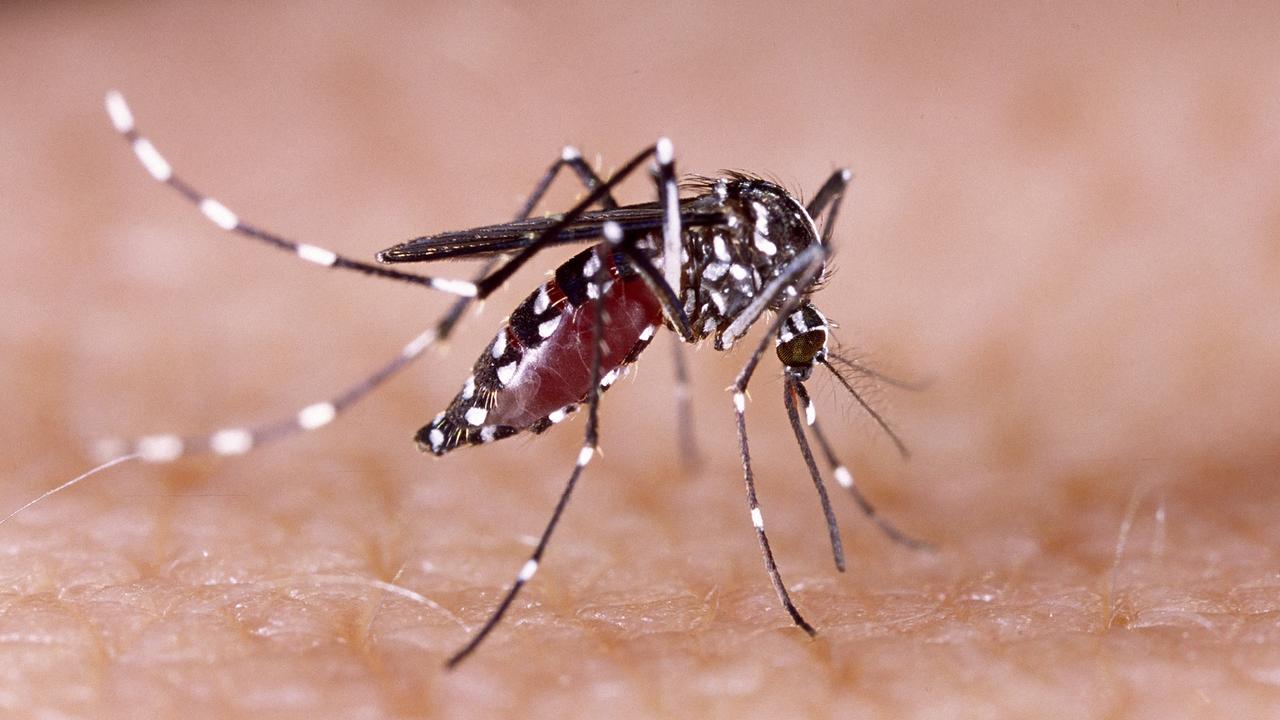
“As a community, keep one another informed. Chat with anyone living at your home, or your next door neighbours, to ensure they know what can be done to protect against mozzies.
“Avoiding bites will also protect against other infections carried by mosquitoes.”
Earlier on Wednesday, WA Health issued a separate statement warning travellers heading to Bali to be aware of dengue fever risks.
WA has recorded 138 cases of dengue fever this year — twice the number of cases compared to the same time last year.
WA Health said most of those cases were acquired in Indonesia, which had reported more than 60,000 cases of dengue fever this year.
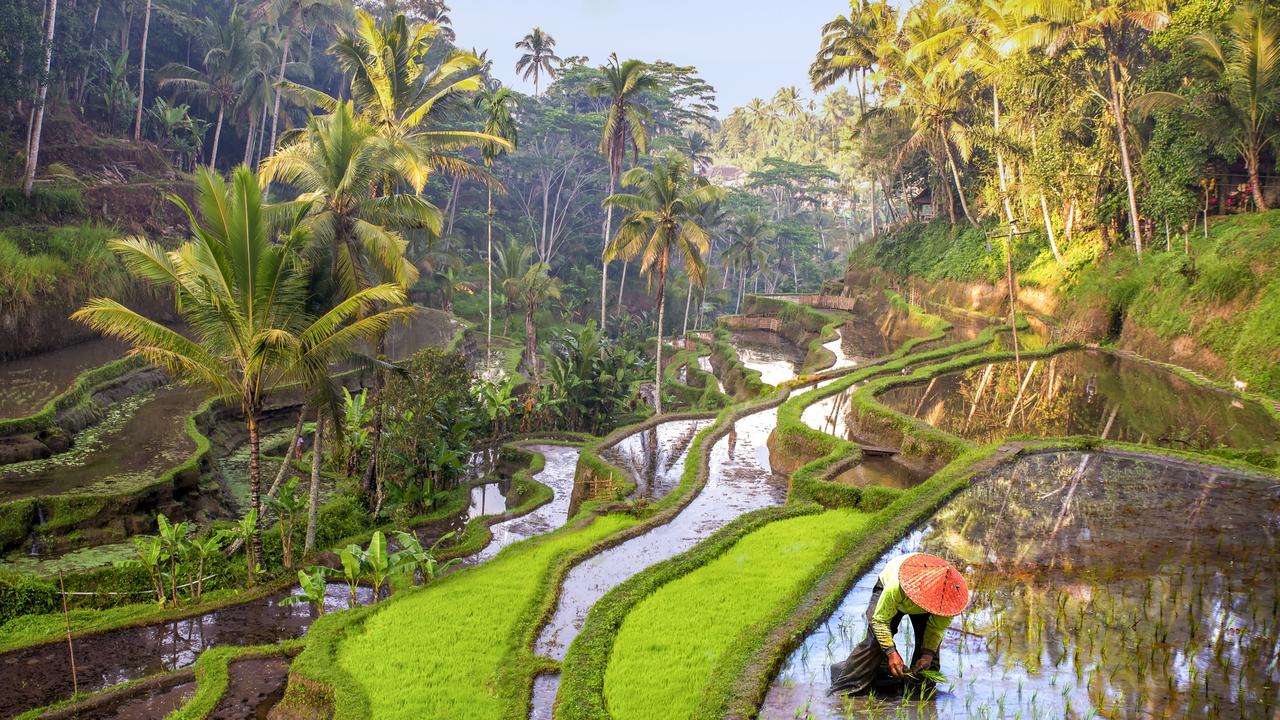
Dengue virus is transmitted to people via the bite of an infected mosquito and while most people will have mild or no symptoms, those who are infected a second time are at greater risk of severe disease which can be fatal.
The Communicable Disease Control’s acting director Jelena Maticevic said the best defence against dengue fever was to protect against mosquito bites when visiting Bali or other high-risk countries.
“Dengue fever is spread through mosquitoes which tend to bite during the day and are usually found around buildings in urban or semi-urban areas,” Dr Maticevic said.
“Symptoms of dengue fever may include fever, rash, headache, fatigue, and joint and muscle pain, with more severe disease presenting with abdominal pain, vomiting, and bleeding from the gums or nose.
“There is no specific treatment for this illness, however the risk of contracting dengue fever can be significantly reduced by protecting against mosquitoes when travelling overseas.”
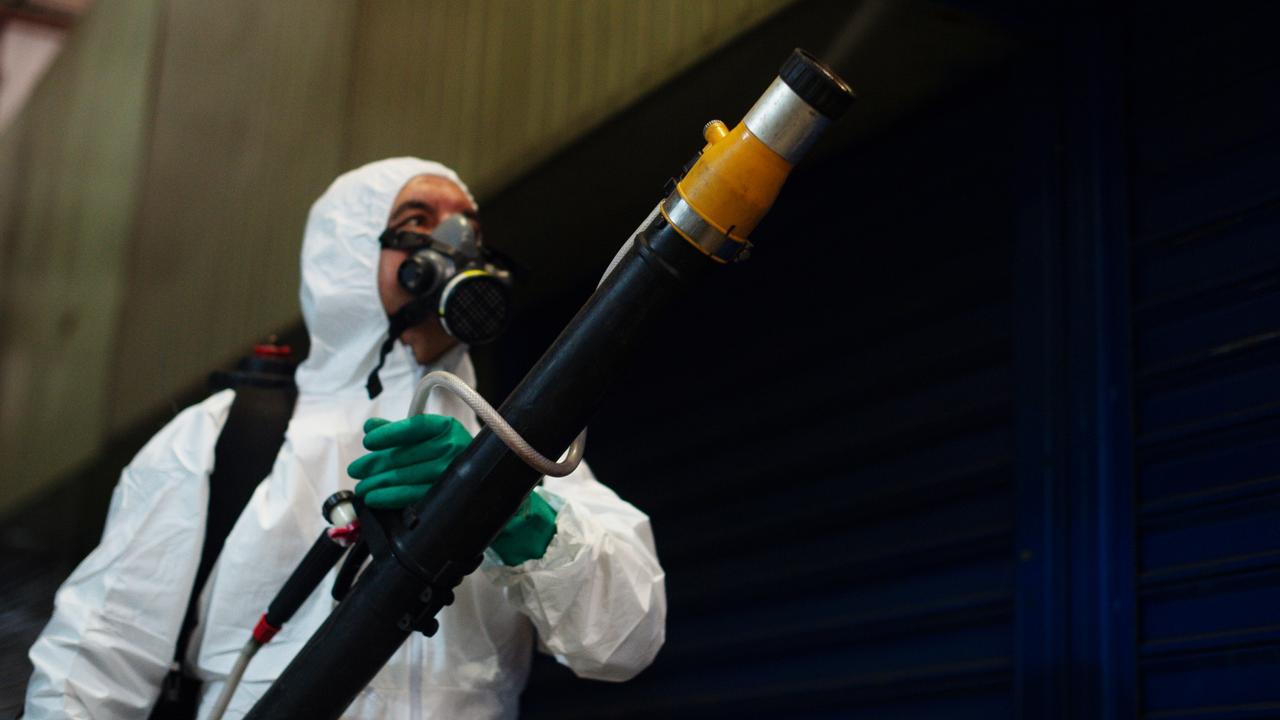
Travellers can take the appropriate steps to prevent mosquito bites during their overseas holidays by avoiding areas of high mosquito activity and wearing long, loose-fitting, light-coloured clothing.
Applying a chemical-based insect repellent containing DEET, picaridin or oil of lemon eucalyptus (OLE), also known as PMD can also prevent mosquito bites.

WA Health suggested travellers should sleep under a bed net, preferably one that was treated with an insecticide, and should close all doors and windows that do not have insect screens.
People should also request that their hotel rooms be sprayed for mosquitoes if they are present.
Anyone who becomes sick when they return to Australia should see their doctor immediately.
A flight attendant has shared the “most heinous, evil, diabolical” things passengers do on planes.
Claudia Gill had fatigue and ringing in her ears after coming home from holiday. When she got to hospital, doctors told her she would have died if she’d been any later.
Staying in a hotel room normally doesn’t come with warnings, but this doctor claims there’s hidden hazards planted around each suite that everyone should know.

IMAGES
VIDEO
COMMENTS
Indonesia, including Bali, currently has an outbreak of foot-and-mouth disease affecting animals. In preparing to travel to Australia, read Smartraveller's advice on biosecurity and border controls. Measures include cleaning dirty shoes, clothing or equipment before boarding your flight to Australia and not packing meat or dairy products.
Tourism. Plan your trip with australia.com, the official Tourism Australia website, offering a wide range of travel information and planning tools including over 2000 images, a currency converter, daily weather updates, interactive maps, suggested holiday itineraries, holiday deals, specialist travel agents and more.
Latest travel advice for Indonesia . For Australians travelling in or to Indonesia. For Australians travelling in Indonesia or planning to travel to Indonesia, please refer to the Australian Government's Smartraveller website for latest news and information related to your trip and subscribe for updates. Travel advice is reviewed and updated regularly.
Indonesian citizens who are planning a trip to Australia aren't required to apply for a visa if they wish to go for short stays (tourism). But it's required to obtain an electronic travel authorization (eTA or eVisa) before entering Australia. Find more information about electronic visas in our articles. Don't rely on information from only one ...
The application process may differ depending on which visa you need. You can only apply for the Electronic Travel Authority visa (subclass 601) through the Australian ETA app. A step-by-step guide on how to apply is located here. For other visas, you can apply online by creating an ImmiAccount and completing the application process. Be sure to submit your application well in advance of your ...
Applying for visas in Indonesia. The Department of Home Affairs' ' Visa Finder ' page can assist you to identify the correct visa for your travel to Australia. So that we can process your application as quickly as possible for you, please ensure that you: Use our checklists to ensure you include all the required documentation.
Travelling to Australia Immigration and Visas. All travellers, except New Zealand citizens, must obtain a visa or travel authority before travelling to Australia.. Immigration and visas. Tourism. Plan your trip with australia.com, the official Tourism Australia website, offering a wide range of travel information and planning tools including over 2000 images, a currency converter, daily ...
Prove your COVID-19 vaccinations when you travel overseas. Services Australia; Passports. The Australian Passport Office and its agents are committed to providing a secure, efficient and responsive passport service for Australia. ... Plan of Action for the Indonesia-Australia Comprehensive Strategic Partnership - 2020-2024;
Australia Investing in Indonesia's Net Zero Transition. Australia's first blended finance investment in Indonesia will be an investment of US$1 million in the South-East Asia Clean Energy Fund. Australia and ASEAN Celebrate 50 Years of Partnership. Today marks 50 years since the first meeting between Association of Southeast Asian Nations ...
These are the new visa perks for Indonesians travelling to Australia. Indonesians will be able to access a frequent traveller visa under a new deal. Here's what else is changing. Travellers at ...
For Australians travelling in or to Indonesia. For Australians travelling in Indonesia or planning to travel to Indonesia, please refer to the Australian Government's Smartraveller website for latest news and information related to your trip and subscribe for updates. Travel advice is reviewed and updated regularly.
The cheapest way to get from Indonesia to Australia costs only $298, and the quickest way takes just 6½ hours. Find the travel option that best suits you. ... Rome2Rio makes travelling from Indonesia to Australia easy. Rome2Rio is a door-to-door travel information and booking engine, helping you get to and from any location in the world.
Bahasa Indonesia; 中文 简体 (Chinese Simplified) 中文繁體 (Chinese Traditional) 日本語 (Japanese) ... Stay safe with the latest travel advice. Everything you need to know before you go. Search Smartraveller. Search. ... 1300 555 135 from within Australia.
Find continuously updated travel restrictions for Indonesia such as border, vaccination, COVID-19 testing, and quarantine requirements. Flights. Hotels. Cars. Flight+Hotel. Travel Guides. ... Travelling from Australia to Indonesia. Most visitors from Australia, regardless of vaccination status, can enter Indonesia. Entry. Open for vaccinated ...
Australian citizens do not need a visa to visit Indonesia for a short-term stay of up to 30 days. They can obtain a visa on arrival at the airport or at any Indonesian immigration office. Australian citizens who wish to stay in Indonesia for longer than 30 days will need to apply for a visa at the Indonesian embassy or consulate in Australia.
Suggested for you. JAKARTA, 23 November 2022 - As an immediate response to recover tourism industry and relaxing the international travel restrictions, COVID-19 Task Force issued the Circular Letter of the COVID-19 Task Force Number 25 of 2022 concerning Health Protocols for International Travels during the COVID-19 Pandemic.
the person is travelling in a large tourist group, especially one that includes older people; the person is travelling on cruises, where people are relatively confined for days to weeks; See also Influenza. Measles, mumps and rubella. Inadequately vaccinated young adult travellers are responsible for most current measles outbreaks in Australia.
Indonesia does not accept the 12-page U.S. emergency passport for entry into Indonesia. BLANK PASSPORT PAGES: Two blank visa pages required for entry stamp. TOURIST VISA REQUIRED: Yes, Visa or Visa on Arrival. VACCINATIONS: None. CURRENCY RESTRICTIONS FOR ENTRY: 100,000,000 Indonesian rupia (approx. $7,000 USD)
The cheapest flight deals from Indonesia to Australia. Perth.$222 per passenger.Departing Fri, 7 Jun, returning Mon, 10 Jun.Return flight with Indonesia AirAsia.Outbound direct flight with Indonesia AirAsia departs from Soekarno-Hatta on Fri, 7 Jun, arriving in Perth.Inbound direct flight with Indonesia AirAsia departs from Perth on Mon, 10 Jun ...
To enter Indonesia, your passport must have an 'expiry date' at least 6 months after the date you arrive and have at least 2 blank pages. Check with your travel provider or the nearest ...
No exceptions. See Passport Requirements. A. If you stay less than 30 days in Indonesia. Visit Visa (also known as Visa on Arrival. (Info, Costs, Application Link, FAQ, can be purchased online! B. If you stay between 30 or 60 Days in Indonesia. Visit Visa ( Visa on Arrival) but needs to be extended once for 30 days.
Visas to visit Australia. Whether you are visiting Australia for less than 72 hours or planning on a stay of several years you must have a valid Australian visa. A visa is a form of permission for a non-citizen to enter, transit or remain in a particular country. Information on visas to Australia can be found at the Department of Home Affairs.
The first case of encephalitis caused by a mosquito-borne flavivirus has occurred in Western Australia, while travellers to Bali have also been warned about a surge in dengue fever.